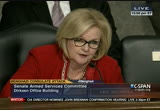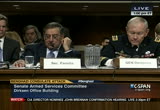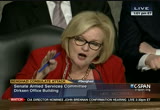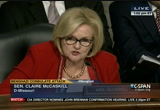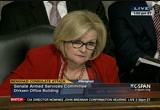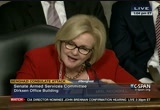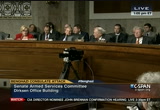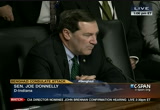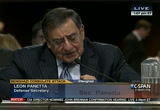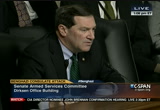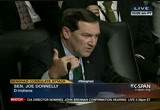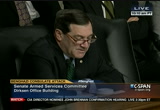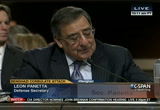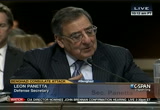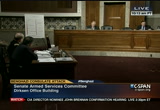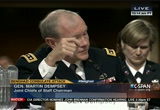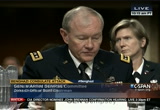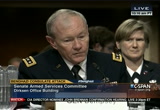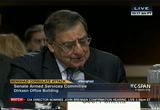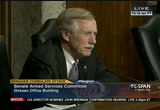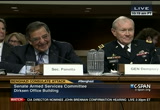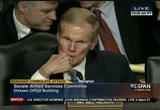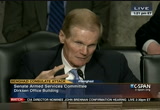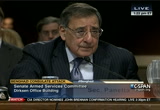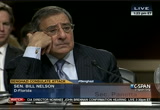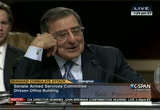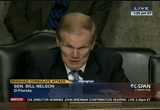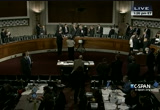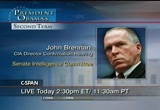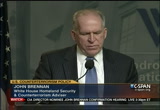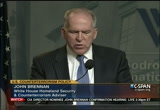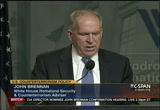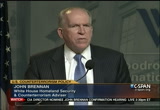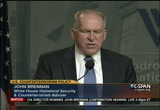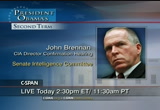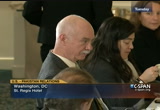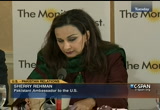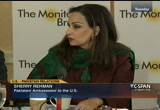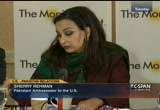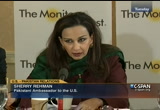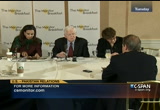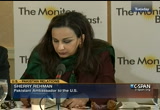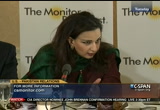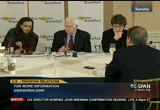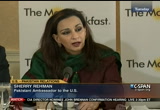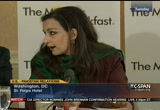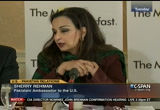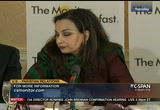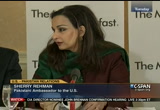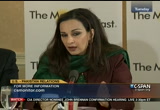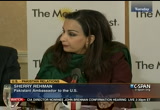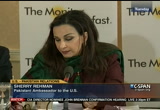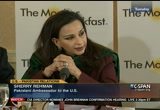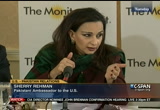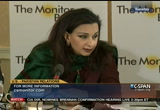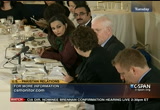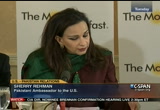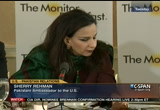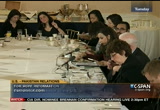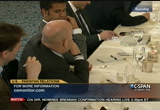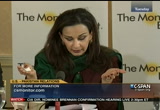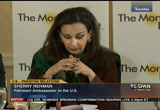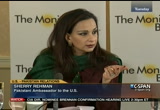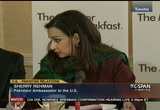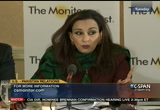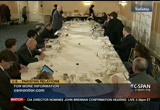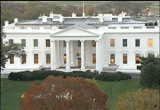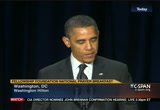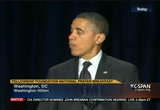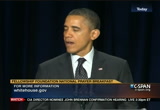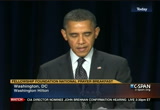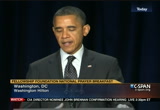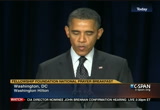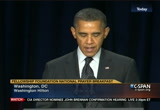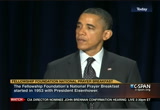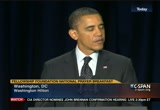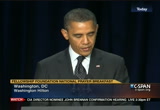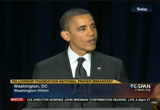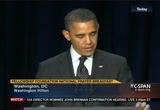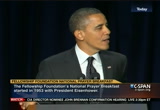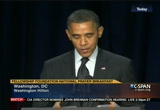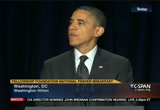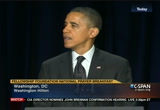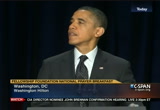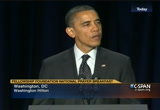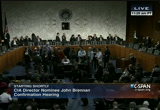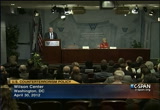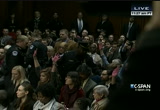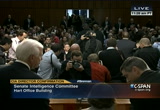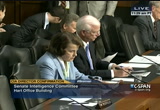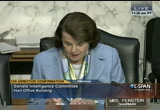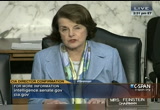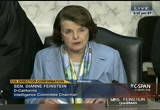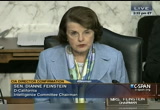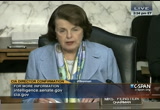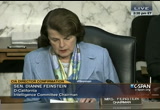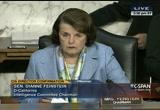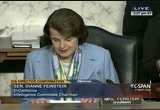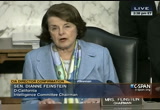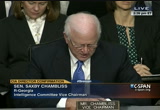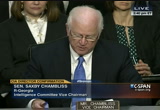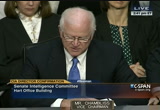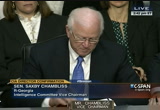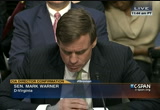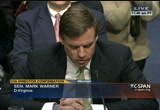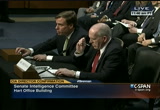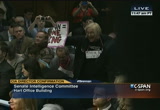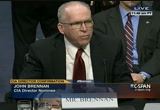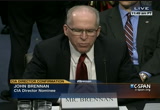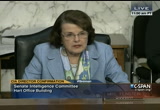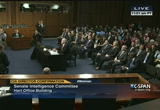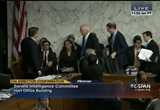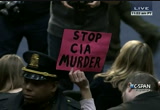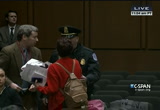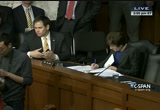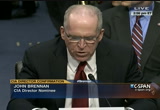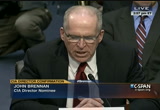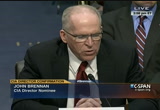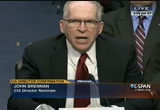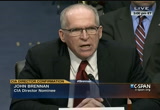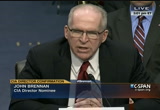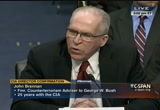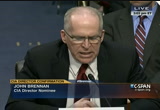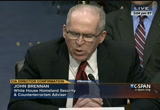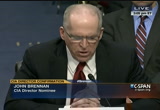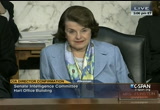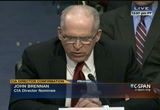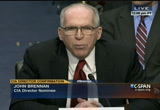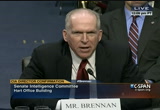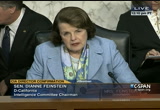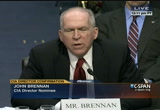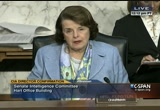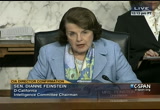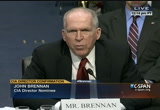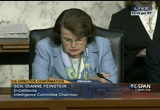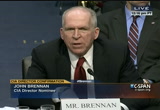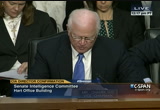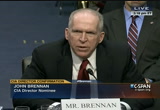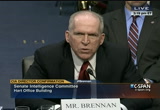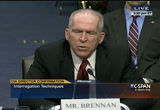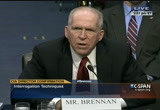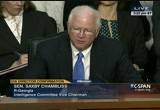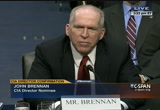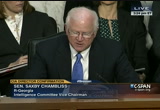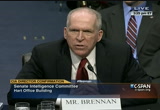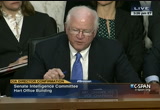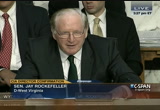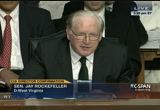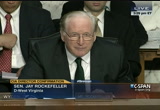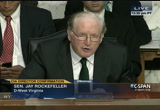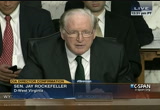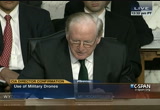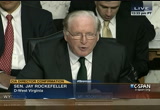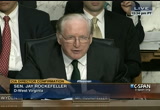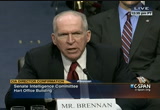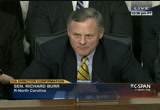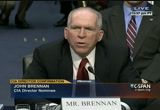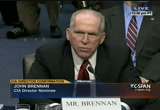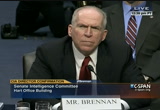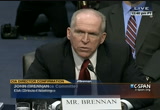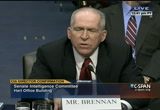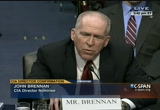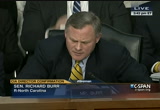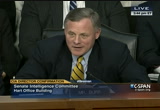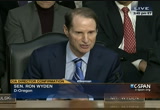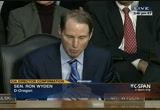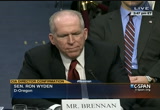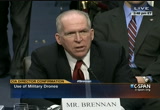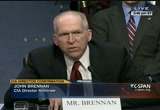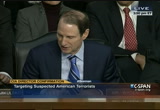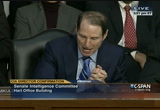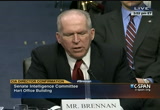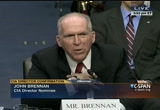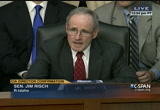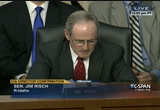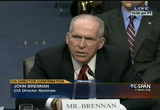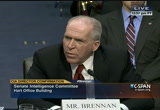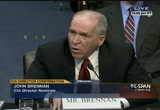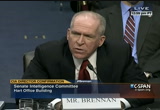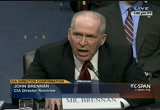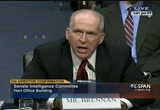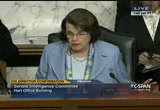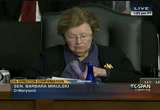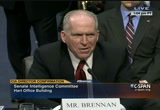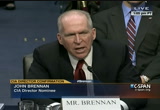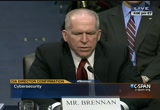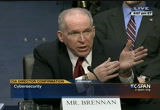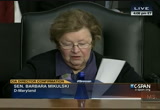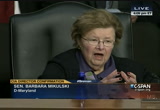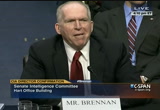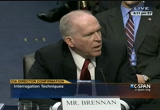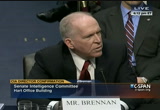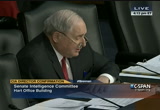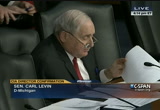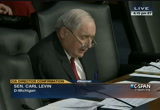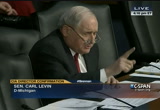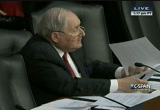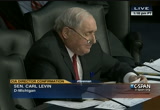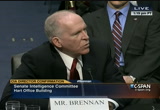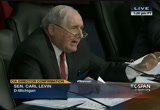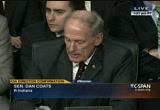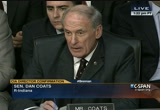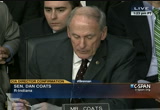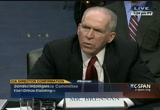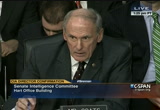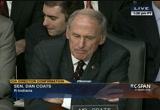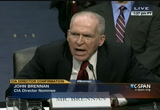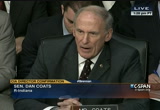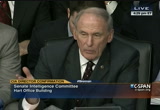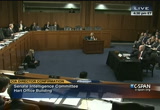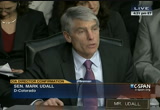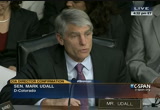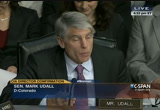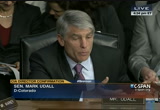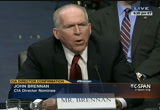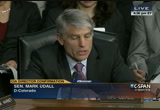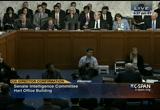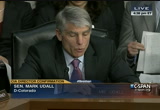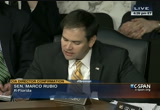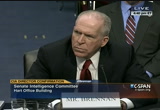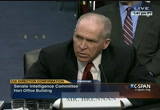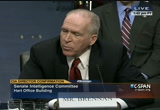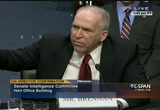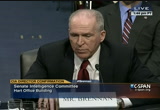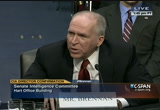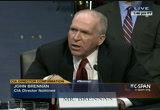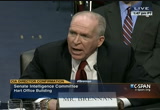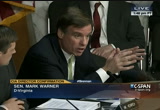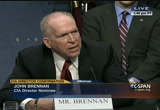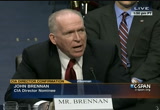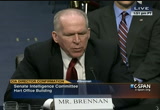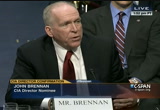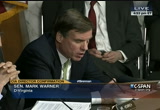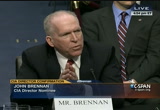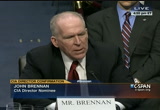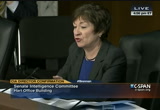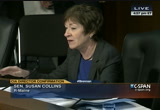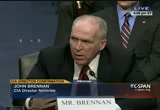tv Public Affairs CSPAN February 7, 2013 1:00pm-5:00pm EST
1:00 pm
gave the contract to for guarding kabul on september 29? eodt. and then of course they were fired for failure to perform. because they could never perform adequately. now we actually -- and they wanted to litigate. meanwhile, guess who is still forwarding -- we still had aegis guarding, another problem contractor at kabul. now we still have armor group. then we did did a contract with aegis. aegis took over this summer. i urge you all to take a look, you don't have to, secretary panetta, you can read a novel, but i hope you all look at the article written january 17 in "foreign policy" magazine about aegis and the problems that have surfaced about them. now i have talked to patrick kennedy about this and his staff has come over and briefed my staff that they believe aegis is
1:01 pm
doing just fine. . >> i won't go into the i.g. report on the background checks. but the people that are at kabul now, it is $100 million a year we are paying them. i can't believe we can't use the marines in these situations. someone has got to do a cost benefit analysis. can you imagine the amount of money we have spent fooling around with these contractors that weren't getting the job done? can you imagine the time we have spent on this and the money that has been spent? i would like for you, general, to talk about the cost benefit of putting marines in our embassies and why in the world this is hard for us to get our arms around and where is the
1:02 pm
analysis that shows us we are saving any money. >> just to react briefly to what would be necessarily a much longer conversation. the marines are not -- that's not their role or what they do for the nation. could it be at some point potentially? i would hate to think we would make that decision based on costs but it would require a longer conversation. >> i guess my point is god forbid we have something happen in kabul. this would look like child's play if you look at the history of what's gone on in terms of the guard force at kabul. and you know, i want to be to rt
1:03 pm
would be necessarily a much longer conversation. the marines are not -- that's not their role or what they do for the nation. could it be at some point potentially? i would hate to think we would make that decision based on costs but it would require a longer conversation. >> i guess my point is god forbid we have something happen contractors are working in these situations, but when we do a $10 billion umbrellas with the ability to do task outs for iraq, afghanistan, jerusalem and costing the kind of money that it's costing and we know these embassies are going to be targets, it worries the heck out of me we will be in one of those situations that it will be uncomfortable to talk about behindsight instead of foresight. the war contracting commission said we should not be using private contractors on embassies when we have this kind of heightened security risk and i think it's time for us to do a gut check on whether or not we should, in fact, be relying on inept militia or inept contractors. >> senator, let me commend you for the work you have been doing with regards to these contracts and the quality of individuals
1:04 pm
that are involved. i mean, the reality is that the state department as a matter of fact, my old agency rely on these kinds of contracts for security and that's a reality. anything you can do to try to make sure that these individuals are well trained, do the job and that we're not wasting money would be extremely helpful because right now, we depend a great deal on that kind of contracting. >> is there a way we can get back to the point that we aren't relying on a contract force to do what is inherently a government function? i hit a brick wall every time i talk about this. why is it it has to be a contract function? why can't we used the best trained military in the world to protect our most valued assets in our most dangerous places? >> i think the reality with
1:05 pm
regards to my old agency is that we are deployed in so many areas that you can't expect the military to pop up there and provide that kind of protection, that they've got to get security onsight and get it from the very best people they can contract with. that has become the reality that we are dealing with. >> if you have the military -- i can see that under the intelligence agency. but for embassies, it seems to me that there shouldn't be a hard reach. thank you both, general dempsey and i hope you enjoy the california weather. >> thank you, senator. senator donnelly. >> mr. spec -- secretary, thank
1:06 pm
you for your service to this country. we are so much in your debt time after time answering the call. thank you very much. and general dempsey -- much better being a general -- thank you everything you have done for our forces and for our country. and i want to express my condolences to all the families who have suffered losses in this tragedy that we will do everything we can to make sure it never happens again. earlier in the hearing, mr. secretary, you said that it is not the department of defense's job to be 911. and so the question that struck me is, so when this happens and it happens so fast and so quick that when you respond in an hour, it may already be over by that time. are we relying on the home country to be 911?
1:07 pm
and if so, as you go through what they're providing to us, you mentioned some are not up to the quality of others at this time, but how are you making that decision that we have people in harm's way and we are relying on a host nation that might not be up to taking care of our people? and if so, as you go through what they're providing to us, you mentioned some are not up to the quality of others at this time, but how are you making that decision that we have >> you know, obviously, it's very important that you know the ambassador determined what is
1:08 pm
the situation and whether or not there's a need for action. i mean the 911 is basically the host country that has to respond quickly and provide mediate security around. if that's not there, you have to have security within the embassy itself. you have to have intelligence that gives you a heads up that it is a dangerous situation and subject to an attack and if that's not there, we have to be in a place where we can be able to respond if we have to. i mean that's kind of your overall 911 to try and deal with situations in the embassies that are out there. >> my concern is as much as these host nations are our friends, their ability obviously is not as successful as our ability in defending our own. and so, how do you determine other than the ambassador telling you we think we are here or there, are there reviews done at the department of defense -- and i don't want to go city by city for security reasons, when you look at these, we'll look at this and determine how safe they
1:09 pm
are security-wise? >> state asked us to join a team that other than would look at 19 emb and determine what was needed there in order to better secure those facilities. and i think based on that, it gives us the opportunity to then deploy additional marines if we have to and take additional steps to try to make sure that those embassies are not vulnerable. we do work with the state department when asked to try to provide guidance with regards to security. >> how often is a review done in some of these places, for instance, a benghazi? is it on a -- when the ambassador says, things are getting tougher or every couple of weeks, is it looked at, has this deteriorated or gotten better. what kind of matrix is used?
1:10 pm
>> the primary matrix has to rest with the state department and the ambassador within that country to be able to review just exactly what is the degree of threats they are confronting and then what actions they should take in order to deal with that. defense department is in a position where we will respond. if we're asked to do something, we will do it. but we're not out there basically making judgments about, you know, what embassies are secure or not secure, what are the threats in the various embassies. you have to leave that up to the chief of station and chief of mission to be able to make that determination. >> with any plans that we have, we have 285 diplomatic missions out there, how far along are we in having plans for all of them?
1:11 pm
>> well, you know, as you said, we have a number of embassies that are out there in the world and not all are benghazi or tripoli or tunisia. the reality is in most countries in the world we can rely on the host country to provide security. they are there and willing to do it and they do a good job. there are some of these embassies in some of these more volatile countries that are of concern and those are the 19 that were designated by the state department as ones we had to look at more closely and then try to develop a better approach to providing security, because
1:12 pm
there, part of the problem is the host countries are not very good in providing that kind of security. >> is there a -- it seems there is so much of a distance and time challenge that when it happens, how quickly can we respond, how far away are we. is there almost like a playbook for ambassadors for the people in those facilities that here's the steps to follow, jump on these immediately. if this doesn't click, we go to this, if this doesn't click, we go to that. >> the best playbook, the best playbook is an ambassador who says we've got serious security problems here. we are threatened and therefore we need to take steps to reduce the number of personnel in our embassy. we need to take steps to evacuate if we have to. and we can then prepare our forces to be able to provide help in that situation. that's the best kind of situation in terms of being able to respond.
1:13 pm
>> if i could add, senator, each embassy has a resident security officer, well trained and emergency action plan for every embassy. generally speaking it is updated, because i have sat on country teams in various jobs. and the attaches are integrated into that process as part of the team. that process exists. what secretary clinton asked me to do soon after benghazi, was to collaborate to see if we could make improvements to that system. >> general, thanks for your service. and mr. secretary, it has been n honor to have you. >> mr. secretary and general, thank you for being here and i would like to associate myself with senator cruz's comments. i'm a first year senator and i'm in the process of hiring a legislative assistant for this
1:14 pm
committee and you go back to california and get nostalgic for this committee, let me know. >> been there, done there. >> the crete base, given that was pretty close in terms of transportation time, why was not an option to get people there faster? >> the bases that we have in southern europe, in the mediterranean area are generally speaking have aircraft. the first point i made is that it wasn't the right tool for the
1:15 pm
particular threat we faced. secondly, the aircraft we have in europe, certainly are there in support of nato and on a different alert posture that th faster? >> the bases that we have in southern europe, in the mediterranean area are generally speaking have aircraft. the first point i made is that it wasn't the right tool for the particular threat we faced. secondly, the aircraft we have in europe, certainly are there in support of nato and on a for the aircraft were not among the forces that we had at heightened alert. it related to boots on the ground was not among the into an embassy o compound to thicken its defenses if we had capabilities that cou get reason to do so. >> and those types of troops were not at the crete base? >> no. >> you talk about everyone wants a fire station next door and doesn't work. on the other hand, as you testified, there was a 13 to 15-hour practical limitation. since this incident, you are trying to shorten that. do you have a target? what would we like to be able to do particularly in these hot spots? >> we aren't done making adapttations. what we did initially was take these forces and the standard had generally been notification plus six plus liftoff transit
1:16 pm
time. we can reduce the alert posture and do so not only watching intelligence, but watching things like the social media, because sometimes these events crop up out of the social media, believe it or not. and secondly, then -- but you still can't reduce the transit time. that is the limiting time. when i say we aren't done making adapttations, we have asked each of the services to examine their capability to build reaction-like forces, small rapidly deployable forces. marine ground air task force and the army is looking at options as well to increase the number of resources across the globe. where the limiting factor we will be facing, especially in africa -- >> you are moving the fire
1:17 pm
stations nearer? >> we are trying to build more firemen but the question is building stations to house them. >> secretary panetta, you are in a unique position, this committee is considering your successor and later on today i will be talking to john brennan. could you give a brief assessment of those two gentlemen and their readiness to assume these important positions? >> obviously that's something that the committees now have the opportunity to evaluate. but in my view, both of them are outstanding individuals that have a them are great deal of e and capability to be able to perform in an outstanding fashion in each of their jobs. senator hagel is who served in the military and worked up here on the hill and understands the issues involved there and can be
1:18 pm
a very effective leader at the pentagon. john brennan is somebody i worked with as director of the c.i.a. and continue to work with in this capacity. and i always found him to be very responsible about how we can effectively conduct operations against al qaeda and against those that would attack this country. he is somebody a straight shooter, somebody who gives you his best opinion. he doesn't play games. he's someone who i think can really honestly represent the best protection of this country in that job. >> thank you very much. and i want to thank you for your forth right comments today about the sequester. ironically as what you said in your statement, it appears the
1:19 pm
greatest threat to the united states security is the united states congress. thank you, mr. secretary. >> thank you. let me mention this, after senator nelson, the first round will be over. there may be a number of us who may want a few minutes on the second round and you two witnesses have been here for three hours and you may need a five or 10-minute break. do you want that following senator nelson or go right through? i can't guarantee how many senators will come back and want two or three minutes each. >> if we could take a short break. >> after senator nelson, we will have a 10-minute break. >> do you need a short break before? what's your pleasure? >> since you asked -- >> i'll make it quick. first of all, thank you, mr.
1:20 pm
secretary. you have been an old and dear friend and you have served your country exceptionally well. thank you. i want to just hit a couple of things, because we've had accusations made here that there were seven hours of warning. the truth is, when -- did i'll give you some leading questions and if you will just answer what you can in an unclassified setting. the so-called first attack was not an attack of shooting, was it? wasn't it suddenly the guards out front disappeared and suddenly people just walked into
1:21 pm
the compound? >> that's correct. >> and this occurred until someone fire bombed the main building, which housed the ambassador, is that correct? >> that's correct. >> and then a response team coming from a nearby location tried to get there, one route and determined that route was not the correct one and went another route, is that correct? >> correct. >> but then they got there, got inside, contest cued one of the -- rescued one of the people but in the process of getting them out from all of the smoke and the fire, the ambassador was not retrieved from the building.
1:22 pm
>> that's right. >> and then things stopped and they stopped for a number of -- as the rescue team and the survivor retreated to the annex, which was some distance away -- i don't recall the amount of distance, but -- >> a couple miles. >> and so everything stopped. >> an hour or two later, there was an attack on the annex and is it true that the main building at the annex was not penetrated? >> that's correct. >> and then that subsided, is that correct? >> that's correct. >> and then for a period of some three hours or more, nothing happened. and then the attack of the
1:23 pm
mortars, which is going through the roof, that's what's killed the two that were there in that building? >> i think they were actually on the roof and that's how they got -- >> i see. well, then that's a lot different from saying that suddenly you had seven hours of warning that what appeared to start, stopped.
1:24 pm
a retreat to an annex, an attack there that was successfully repeled and stopped and then hours later, a mortar attack. so i would, mr. chairman, like the record to show that what has been characterized here is in the evaluation of the decision makers about their ability to get a response team in there -- is it also correct that the response team from tripoli were landing on or about the time that the mortar attack started? >> that's about right. when they landed, they immediately went there and came under fire. >> and finally, i'd just say going into the sequester, to respond to these kind of attacks in the future and there will be these kind of attacks in the future. sequester certainly wouldn't put you in a better position in order to respond, would it? >> absolutely not. >> have a hard time trying to
1:25 pm
provide the resources in order to be able to do this. >> thank you, mr. secretary. >> i just want to make one comment related to your cronology, because i think it's -- chronology, because i think it's important. once we started moving forces, nothing stopped us or slowed us. the only adapttation we thought about making was for a period of time we making was for a thougho be entering a hostage rescue because we didn't know where the ambassador was. once we started forces moving, they didn't slow, they didn't stop. >> and you didn't know the situation with regard to the ambassador until hours later when, in fact, some libyans had come into that facility and tried to rescue him and found him at that point unresponsive from smoke inhalation? >> that's right. >> thank you, mr. chairman. >> thank you, senator, nelson.
1:26 pm
1:27 pm
the committee is taking a 10-minute break and come back and wrap up. there are a number of senators including lindsay graham asking for a second round of question. a program advisory, we will continue to cover this hearing live and follow it on c-span.org . here in c-span at 2:30, we will go live to the senate intelligence hearing, their confirmation hearing for john brennan who is currently president obama's counter terrorism adviser. members are expected to ask him about the c.i.a. drone program conducting drone strikes on terror suspects. at the wilson center last year, mr. brennan called those legal, ethical and wise and the highest counterterrorism standard to limit the loss of civilian life. here's what he had to say in
1:28 pm
april of 2012. >> i stand here as someone who has been involved in our nation's security for more than 30 years. i have a profound appreciation for the truly remarkable capabilities of our counterterrorism professionals and our relationships with other nations and we must never compromise them. i will not discuss the sensitive details of any specific operation today. i will not, nor will i ever publicly divulge sensitive sources and methods, for when that happens our national security is endangered and lives could be lost. at the same time, we reject the notion that any discussion of these matters is a step on to a slippery slope that endanger our national security. too often, that fear can become an excuse for saying nothing at all, which creates a void that is then filled with myths and falsehoods. that, in turn, can erode our credibility with the american people and foreign partners and
1:29 pm
undermine the public's understanding and support for our efforts. in contrast, president obama believes that done carefully, deliberately and responsibly, we can be more transparent and still ensure our nation's security. so let me say it as simply as i can. yes, in full accordance with the law and in order to prevent terrorist attacks in the united states and to save american lives, the united states government conducts targeted trikes against specific al qaeda terrorists, sometimes using remotely pilotted aircraft often referred to publicly as drones. and i'm here today i'm here tod president obama has instructed us to be more open with the american people about these efforts. broadly speaking, the debate over strikes targeted at individual members of al qaeda has centered on their legality, their ethics, the wisdom of using them and the standards by
1:30 pm
which they are proved. for the remainder of my time today, i would like to address each of these in turn. first, these targeted strikes are legal. attorney general holder, harold coe and jay johnson have addressed this question at length. as a matter of domestic law, the constitution empowers the president to protect the nation from any imminent threat of attack. the authorization for the use of military force passed by congress after the september 11 attacks, authorized the president to use all necessary and appropriate forces against those nations, organizations and individuals responsible for 9/11. there is nothing in the aumf that restricts military force against al qaeda to afghanistan. as a matter of international
1:31 pm
law, the united states is in an armed conflict with al qaeda, the taliban and associated forces in response to the 9/11 attacks and we may also use force consistent with our inherent right of national self-defense. there is nothing in international law that bans the use of remotely pilotted aircraft for this purpose or that prohibits us from using lethal force against our enemies outside of an active battlefield at least when the country involved con cents or is unwilling to take action against a threat. second, targeted strikes are ethical. without question, the ability to
1:32 pm
target a specific individual from hundreds or thousands of miles away raises profound questions. here, i think it is useful to consider such strikes against the basic principle of the law of war that govern the use of force. targeted strikes conform to the principle of necessity. requirement that the target has definite military value. in this armed conflict, individuals who are part of al qaeda or its associated forces are legitimate military targets. we have the authority to target them with lethal force, just as we target enemy leaders in past conflicts such as them and the which they are proved. for the remainder of my time today, i would like to address japanese commanders during world war ii. targeted strikes conform to the principles of distinction, the idea that only military objectives may be intentionally targeted and civilians are not targeted. remotely pilotted aircraft to precisely target a military objective while minimizing collateral damage, one could argue that never before is there a weapon that allows us to distinctish more effectively between an al qaeda terrorist and innocent civilians. targeted strikes conforms to the principle of pro porment. the collateral damage of an
1:33 pm
action cannot be excessive to the military advantage. by targeting an individual terrorist or small number of terrorists that can be adapted to avoid harming others in the immediate vicinity, it is hard to imagine a better tool to minimize the risk to civilians than remotely pilotted aircraft. for the same reason, targeted strikes conform to the principles of humanity, which require us to use weapons that will not inflict unnecessary suffering. for all these reasons, i suggest
1:34 pm
to you that these targeted strikes against al qaeda terrorists are indeed ethical and just. >> counterterrorism john brennan in april of 2012 talking about drone strikes. the white house yesterday authorized the release of classified documents to the intelligence committees regarding those targeted drone killings. he is for the same reason, targeted strikes conform to the principles of humanity, which require us to use weapons that will not inflict unnecessary suffering. for all these reasons, i suggest to you that these targeted strikes against al qaeda terrorists are indeed ethical and just. >> counterterrorism john brennan in april of 2012 talking about drone strikes. the white house yesterday expec that during his confirmation hearing coming up at 2:30 eastern this afternoon and we'll have it live. meanwhile on tuesday, pakistan's ambassador to the u.s. discussed the issue of drone attacks saying strikes are indirect violation of international law and her events came at an event hosted by the "christian science monitor." >> i want to ask you about the drones. pakistan's position is that the drone strikes are a violation of your sovreignty and international law and i think under both of those guidelines you have the right to self-defense. and further, just to guide your answer, has pakistan threatened to shoot down drones, and if not, why not? the reason i ask this is because
1:35 pm
there is an understanding that while pakistan publicly opposes the strike, privately it sort of winks. >> let me address this as most people do to speak to what they can in terms of the question put and it's an important question and you do ask -- you ask a question which many ask, is there a quiet come policity in this. let me assure you, there is no question of quiet come policity or wink and nod. this is a parliamentary red line all government institutions have internalized as policy. and you know, i say this as not just a policy that i -- that we say. it is important to us to recognize because drones are
1:36 pm
actually seen as a very negative and unfortunate -- lend an unfortunate view of u.s. power and how the united states projects its power abroad. every time there is a drone strike, you see it on 40 channels at least in pakistan. we have a very robust free media and you see them on all these channels that the u.s. flag on its livery. so that in and of itself makes life very difficult for us as we build consensus, public consensus against arab people saying this is the united states' war, not ours. we have addressed that challenge. it is now counterproductive
1:37 pm
because it can -- it creates more potential terrorists on the ground and militants on the ground instead of taking them out. if it's taking a high valued or medium-valued target, it is creating an entire community of future recruits to a cause we are seeking to gain sympathy for in all these areas. we need to drain the swamp and what it does, it is radicalizing people that are standing up against militants using religion as a mobilizing force. so i think that drones as an instrument may have had some secrecy in terms of position, but -- and it's like saying,
1:38 pm
well, we can't allow u.s. f-16s to come in, we use our own to run anti-terror operations when we can, when we are able to move the population and protect them. so drones are now -- we don't see them as productive at all. >> what do you tell the germ's staff -- what do you tell the staff -- >> you need to be a fly on that committee wall. >> jonathan. >> i think we are all. on the same page. members of the general's staff on where the future of this -- pakistan has to take ownership of all anti-terror operations, absolutely all of them for them to be sustainable and to be seen
1:39 pm
as legitimate in the eyes of our people. you know, there have been a lot of drone strikes next door also. and in any case, you know that al qaeda is the whole al qaeda high valleys is pretty much through our cooperation and joint efforts. and that's something this administration will efforts. and that's something this agree also. >> you talked about the process. president karzai has developed and presented both pakistan and the united states his road map for 2015. that road map substitutes pakistan for the united states in terms of brokering face-to-face talks between the afghan taliban and mr. karzai's government. and it's been accepted by your government. i would like to know how much progress your government has
1:40 pm
made in terms of arranging these face-to-face talks. and president karzai's government would like your government to release the man who was the number two on the list. your government has refused to do so. i would like you to square that with your assertion -- >> when was the last time you heard about this particular release? i would recheck that with your administration if i were here. >> the afghan defense minister presented that last week. >> he has left a happy man and i'm sure -- >> are you denying? >> we don't discuss lists in public forums, but it is not -- we have the number one, you said something about a substitution. we, as i said very clearly have come to this whole process -- we
1:41 pm
have been asked to come to this whole process quite late as your forces draw down with an announced timetable and we have been asked to a date. we will assist as they ask for whichever prisoner releases. we have been doing that. we have been doing that in a complete coordination as the cow we have been doing group process. incidentally that kept running even when lie level jobs were suspended between the united states and we kept that process going. i think there is no substitution at all. >> i read it online. >> you can read that online and the way we read it, we will do everything we can and we will do everything we can in the time line that they are looking for. >> they talk by the end of this
1:42 pm
year. >> absolutely. we are very clear. we want to and we are happy to arrange whatever we can. and i think you might have seen out of the engagement that we all had with the u.k., the two of us had with the u.k. just recently. we are even supporting the qatar process and we have said on record we support all processes that might bring any chance of a sustained negotiated peace settlement and we will support that. >> the blueprint and perhaps you can correct my confusion on this. his blueprint, which your government has got and has been working with the government on -- talks about actually moving that process to scrabe and pakistan to take the lead in arranging face-to-face peace
1:43 pm
talks. >> we can -- they are asking for a time line of releases, which we are cooperating with. quite diligently. and the united states still is engaged in this process. i mean, as i said, we cannot then sit there and pose as guarantors for afghans. we can certainly assist the united states in seeking whatever -- if there are releases to be made, we are making them and making them according to their time line.
1:44 pm
the iran peace council and we have met in islama bad and met in london as well. so we will move accordingly. absolutely. that's as far as i can say. i'm happy to speak to this off the record when you like. >> do that later. >> we have 20 minutes later. emily. >> i wanted to follow up -- just a point of clarification. the prisoners that have been released in recent months, those have all been done, is there a
1:45 pm
vetting process? can you talk about what the process is for making those decisions? >> that's the process and -- the united states has been engaged in. and we are absolutely following their lead. we are going to be doing this and i keep saying there is a reason why we are saying -- they have to be engaged in how they take this forward. it has to be a road map and we will move according to their chronology. >> my second separate question is on the support for coalition funds. there was a period of time when the u.s. stopped reimbursing pakistan for those. we are at a point -- in terms of the reimbursement or still missing funds? what is the status? >> we have accounting periods that we talk about. and they were suspended over the six to seven months -- as you know, those have been cleared. and we do always have a
1:46 pm
difference between what we say is you know is due because these coalition support funds are not aid to pakistan. certainly that's not we say is you know is due because these coalition support funds are not aid to pakistan. certainly that's not the view. and i believe there's a discussion for forward movement on that. >> jamie? >> thank you, ambassador for doing this. in a pretty remarkable speech last summer, your predecessor said that there is not a convergence that exists between pakistan and the united states to maintain an alliance that pakistan behaves like syria but wants to be treated like israel and basically implied that u.s. should cut off aid and that was the only way this relationship can get along. i wanted to get your comment to
1:47 pm
that and in addition, have you seen the movie "zero dark thirty"? >> very zero and very dark. what can i say? as far as the ambassador's concern, we are a democratic country and everybody speaks out and he is entitled to his views and i believe he said not in office. those are views -- i mean, those are -- our civil society view point. we think that pakistan -- and that may have been said a while ago. pakistan has demonstrated a clear shift and i keep saying that we have made a very clear shift and we call this a regional pivot. the president said in his speech at the united nations that for us, kabul is the most important right now. so we take the lead. we do not want a repeat of what we saw 30 years ago. and we don't want a surge of violence into our own country. we have enough to deal with
1:48 pm
there. we have 150,000 soldiers on that western border. we have committed our entire country and its resource to this battle ahead. it's pretty much our own endeavor to fight extremism and terrorism. as you know, we have made an investment in reaching out to both sides, not just one. our regional pivot is a regional pivot to all the countries and india. and this is a historic change -- we have opened up the trade lines, and in terms of security, we have clearly said there is going to be no interference in the whole politics of an iran reconciliation or government making as they're going to their own election and u.s. transition.
1:49 pm
pretty much this is a process and that's where we stand. there will be no favorites we play at all. which is why we are very careful now to say we are going to back their lead. i'm sure you have noticed -- this is the most underreported story in all of history, that we are dismantling an entire -- 50 years of scaffolding of terrorists and trade barriers that stood between the two countries and i think that we are looking forward to a future where we can accord -- the entire region, the dividends of enhanced trade, peace and other opportunities. our banks are opening up branches in each other countries and while we remain engaged in dialogue on other issues, we are able to deescalate when it
1:50 pm
arising. we have strategic policy in the region. >> you are going to have elections in pakistan this year and elections in afghanistan next. what challenges do they pose to the people moving forward? >> well, pakistan's election is pakistan's election and we are very different in terms of how we fracturely and constitutionally run this election. as i said, it's been the first constitutional peaceful transfer of power. pakistan has conducted elections. we also this time built institutions to safeguard
1:51 pm
democracy. we don't see it as an election. and as we have given power to the provinces through historic shifts, our constitutional and resource council in pakistan. one of the institution building processes that vice president kept us busy there is the sure this is the appointment and building of an election commission that is cleared by an -- and appointed by a bipartisan committee of parliament meaning that the opposition -- the appointment and the rules of the game on how that election is run. so -- the level playing field - that we sought for many years, that is the level playing field that we are providing in this first historic election because all parties have agreed on this. the election commissioner himself is a respected independent retired jurist who
1:52 pm
is acceptable to everybody and one of the first acts of this election commission was to i think the ruling party's own candidates and we have to accept that. our courts are proactive. we have been bowing down to all their judgments because we are invested right now. and the media, as you know, is extremely independent and holds the power to transmit opinion everywhere and across the board. so the elections are going to be held on time. they will be held with a caretaker government in place whisper our constitution. that caretaker government has 60 to 90 days to run that election
1:53 pm
so the incumbents are not able to influence the outcome. and we are pretty much on time and on course for that. >> any effect on the peace process? >> as i said, there is a peace process. pakistan is running pakistan right now, but we will certainly assist in the peace process as and when required. all the centers are through the election, i think everybody will remain engaged. we are two months into a run-up but constantly engaged in this process. so i don't see it becoming a victim of our elections certainly and at the end of the day there will be a peace
1:54 pm
process. >> i just wanted to first follow up on jonathan's question, if i could get you to clarify a little bit. the afghan and the americans have complained that in the prisoner releases thus far those who have been released have been been low down on the list of what they have been asking tore and haven't been released as requested directly but you said that when asked about broader, you said when was the last time you heard about this particular release and the afghan defense minister left the meeting a
1:55 pm
happy man. >> i'm talking about a list of releases that are made as per their request. >> since that's at the top of their list, would you expect this to come sometime soon? >> this is a decision they will make together? >> and following on that, on the question of being desserted more or less by the united states, what would be pakistan's thought about the size and mission of the united states -- inaudible -- continue counterterrorism operations to some extent directed to pakistan? >> to be directed towards pakistan? >> when we are able to ex trap late that. we we have made our position on counterterrorism clear on all levels. but we will be cooperating but it has to be according to our own constitution and acceptable limits, which is, you know, the drones are the red line here. >> do you have a sense of what size force and what missions the
1:56 pm
force would best accomplish pakistan's aim of preserving stability? >> pakistan has no aims. this is the new pakistan. we are looking to secure pakistan right now. and we have no aims other than to assist our brothers and sisters whatever they seek going forward. the united states has left or nato has really left no serious -- i mean one of the things that would worry us is that the border is becoming increasingly volatile and where we see -- we have been constantly asking for narcotics interdiction on that border and didn't become part of the nato charter. so we do see -- these are nonglamorous issues but this is
1:57 pm
the here and now for us. we have 800 borders just for smuggling and the issue brought up, we are interdicting more than anybody else on that border. there is nothing close to matching interdiction capability on the other side of that border which used to be regional command east, if i may so. now, of course, -- the ratio is something close to 8-1. we have 800 check posts and they have 100. this needs to be looked at more seriously. these issues need to be looked at far more seriously. >> we have five minutes left. >> first of all, on this question of u.s. role after the
1:58 pm
drawdown, are you saying that since you bring up the question of a border in conjunction with answering the previous question, are you saying that you feel that the united states should have more or a role, for example, in safeguarding the border would be more than a training role or counterterrorism role? are you saying that you see a greater role for the u.s. after the drawdown? and secondly, i'm very dark, but it secondly, i'm curi dark thirty, you say it is is q. >> i can hardly address hollywood, can i? >> i don't know how you would explain the movie's popularity. >> i don't know which poll has told me that. >> apparently --
1:59 pm
>> if you are pleased. i think there's much more hollywood going in terms of pakistan -- i mean that's what is pulling people in theaters. we have music bands being exported going into india and that's the story there. it may not make great copy, but that's what's happening, not "zero dark thirty." >> the u.s. role, i can speak to you about what we have sought to accomplish together and where we need to go. for instance, if you just talk about cooperation with the united states and where we have come from say 2009 to 2012 in terms of -- this is what pakistan has done alone.
2:00 pm
37% of the tribal areas were in government control in 2009 and now we have about 86% in 2012. so we are doing what we can to restrict the operational space for terrorists in our tribal areas. . it is hard to into their date -- interdict. we have not seen any operations on the other side. we are not allowing other a operations inside pakistan. where are doing what we can with stretched resources, and i want to say what we can do is share information. the blame game, that is one of the worries. if there is a failure in a theater, that has to be put to
2:01 pm
someone's docket. that is what we want to avoid and we have been avoiding that. the u.s. can assist and enhancing pakistan's counter-terrorism interdictions. for us, we are looking at it any longer haul, and we have x amount of capacity. compare that to the united states for 10 years. our defense budget is $5 billion for the whole year. you are spending $2 billion a week. it is not even apples and oranges. he not always lay at our door, this big global force what cannot do in pakistan. we will continue to do that responsibily.
2:02 pm
>> mentioned several times that the notion of the drones being a red line, when countries are allies talk about red lines, if one country crosses that redline, that is grounds for a breach for some kind of aid, if not striking down those drones, a breach in relations. we have not seen that kind of a breach as we have seen over salala, and i am wondering why not. >> that was the killing of our soldiers on that border by partner. this is an anomaly that we are constantly at dressing in all conversations with the united states. it certainly is not part of our playbook to have drone operations carried on in pakistan.
2:03 pm
it never was, and we do not see it as the future of -- and we do not want to our engagement with the united states to be defined by that or our operations to go to this kind of low. i have to say that there has to be more strategic sympathy for what pakistan has done and continues to do in terms of contributing to this effort. it has been a very long haul for us, and we committed to the joint effort. there were no suicide bombings in pakistan. the number now is more than one a day. excuse me? there was one. can give you that. i have done this for the closed- door parliament the minister, and i have this information.
2:04 pm
there was one. and now there are over one a day, if we take that number. i am talking about 2001. >> the other question is, since it is a serious issue, why not take it to the next level? if that is not shooting down american drones -- >> i know you need to make that deadline, but i cannot speak to that issue. we do not discuss issues beyond a point. >> the second part is post 2014, you have made a lot of compelling points about how you are working with limited resources, not getting the cooperation on the other side of the border from the international forces in afghanistan. if the u.s. and coalition forces
2:05 pm
are going to leave a light footprint, isn't that on to make it harder for you? >> >> that is why we are looking at in supporting the negotiated peace process. clearly, force has not been an answer over the years, and we have always suggested the talking start at an earlier stage. >> we thank you for your efforts. >> i appreciate no quotes out of context, having been an editor for 20 years. >> thanks again. [captions copyright national cable satellite corp. 2013] [captioning performed by national captioning institute]
2:06 pm
>> wednesday the white house authorized the release of documents related to target drone killings to the intelligence committees on capitol hill. the senate intelligence committee will hear from the president's counter-terrorism advisor at 2:30. he has been nominated to be the next cia director. live coverage on c-span. president obama on his way back from leesburg, virginia, where he spoke with house democrats on their annual policy retreat. this morning the president joined congressional members at this year's the s-chip foundation national -- this year's fellowship foundation national prayer breakfast. >[applause] >> thank you.
2:07 pm
thank you so much. thank you very much. please have a seat. that you for that introduction. i thought he was going to talk about my gray hair. [laughter] it is true that my daughters are gorgeous. that is because my wife is gorgeous. [applause] and my goal is to improve my gene pool. thank you for your wonderful work on behalf of this breakfast, to all of those who have worked so hard to put this together, to the heads of state, members of congress, and my cabinet, religious leaders, distinguished guests, to our at standing speaker, to all the
2:08 pm
faithful, who journeyed to our capital. michelle lanai are truly honored to be with you this morning. before i begin, i hope people do not mind me taking a moment of personal privilege, i want to say a word about a close friend of mine and yours, joshua dubois. led you may not know joshua, but he has been at my side and work in prayer for years now. he is a young reverent, but wise in years. he has worked on my staff, done out stannic jobs as the head of our faith-based office. every morning he sends me by way of the male -- email a daily meditations, snippet of
2:09 pm
scripture for me to reflect on, and it has meant the world to me. tomorrow will be his last day in the white house. this morning i want to publicly thank joshua for all he has done, and i know everybody joins me in wishing him all the best in his future endeavors, including getting married. [applause] it says something about us as a nation and a people that every year for 61 years now this great, prayerful tradition has endured. it says something about us that every year in times of triumph and tragedy, in calm and crisis, we come together not as democrats or republicans, but as brothers and sisters had as children and of god.
2:10 pm
every year in the midst of all are busy and it noisy lives, we set aside one morning together as one community, united in prayer. we do so because we are a nation ever humbled by our history, and ttentive to at a tent our imperfections, particularly of our president. which come together because we are people of faith. we no faith is something that must be cultivated, fe is not a possession, faith is a process. i was struck by the passage that .as read earlier from heber's -- from hebrew script without
2:11 pm
faith it is impossible to know god, because everyone who comes to him knows he exists and he rewards those who seek him. he rewards those who diligently seeking. not just for one moment and one day, but for every moment and every day. as christians we place our faith in and hands of jesus christ, but so many americans also know the close embrace of faith. muslims and jews, hindus, and and all members of religion have a deep abiding faith in this nation. i have reflected on the power of faith a few weeks ago during the inauguration. i was blessed to place my hands on the bibles of two great
2:12 pm
americans, two men whose faith lives today. one was the bible owned by abraham lincoln, and the other, the bible owned by dr. martin luther king jr. i thought about these two men and i thought about how in times of joy and pain and uncertainty they turned their bibles to seek the wisdom of god thought of how for as long as we have been a nation, so many of our leaders, presidents preachers, legislators, and tourists have done the same. each one faced their own challenges, each one found their own lessons from the lord in scripture. as i was looking out in the crowd during the inauguration, i thought of dr. king i.
2:13 pm
we always think of him as addressing the crowd with a bellowing voice. i also thought of his doubts and his fears, for those moments it came as well, when he was confronting the presence of imaginece and hate, the darkness that must have surrounded him when he was in a birmingham jail, and the anger that rose up in him the night his house was bombed with his wife and child inside, the grief that shook him as he eulogized those four girls taken from the earth as they gathered in a house of god. i was reminded that dr. king was a man of audacious hope and relentless optimism, but he was
2:14 pm
also a man of occasionally brought to his knees in fear and doubt and in helplessness. and in those moments we know that he retreated a loan to a quiet space to reflect and he could pray and grow his faith. i imagine he turned certain obverses that we now read -- certain vs that we now read, and i imagine him reflecting on isiah, that we laid upon the lord, that the lord shall renew those who wait, that they shall mount up with wings as eagles, and they shall not be wary, and they shall walk by and not faint. we know that in scripture dr. king down strength. in the bible he found conviction. in the words of god he found a
2:15 pm
truth about the dignity of man that he never relinquished. we know lincoln had such moments as well. to see this country torn apart, to see his fellow citizens waging a ferocious war that pitted brother against brother, family against family, that was as heavy a burden as any president will have to bear. we know lincoln met with troops and visited the wounded and honored the dead and a tall mountain day after day and week after week, and you can see in the lines of his face the told that the war-- the toll that the war cost him. but he did not break, eason and he buried the blood of some,
2:16 pm
even as he struggled to overcome a melancholic, despair, grief. he did not break. we know that he surely found solace in scripture, that he could acknowledge his own doubts, that he was humbled in the fifth of the lord -- in the faith of the loard. that allowed him to become a better leader, and allow him to become to describe union and confederate soldier alike reading the same bible, where the parade to the same god, but the prayers of both could not be answered, and that of neither has been answered fully. the almighty has his own purpose. and lincoln's eyes, the power of faith was humbling, allowing us
2:17 pm
to embrace our limits in knowing god's will and as a consequence he was able to seek god those who vehemently opposed him. today the divisions in this country are thankfully not as deep or destructive as when lincoln led, but they are real. the differences in how we hope to move our nation forward are less pronounced than when king marched, but they do exist. as we debate what is right and what is just, what is the surest way to create a more hopeful world for our children, how we will reduce our deficit, what kinds of tax plans will have, how we will make sure every child is getting a good every child, it is encouraging to me that you turned out so well by your mom not letting you watch tv. i am going to tell my daughters
2:18 pm
that when they complain. [laughter] in the midst of all these debates, we must keep that same humility that dr. king and lincoln, washington and all our great leaders, understood, is at the core of true leadership. a democracy as big and as diverse as ours, we will encounter every opinion, and our task as citizens, whether we are leaders in government or business or spreading the word, it is to spend our days with open hearts and open minds, to seek out the truth that exists in the opposing view, and find a common ground that allows for us as a nation, as a people to take real and meaningful action, tnd we have to do that,
2:19 pm
humbly, and we have to do it every day, not just at a prayer breakfast. i have to say this is now our fifth prayer breakfast, and it is always just a wonderful event, but i do worry sometimes that as soon as we leave the prayer breakfast everything we have been talking about the whole time it seems to be forgotten. on the same day of a prayer breakfast. [laughter] you would like to think that the shelf life would not be so short. i go back to the oval office and i start watching the cable news network's and it is like we didn't pray. and so my hope is that humility,
2:20 pm
that that carries over every day, every moment. while god has revealed his plan to us in portions, the expense of his plan is for god and god alone to understand, for now we see through a glass darkly, but then face-to-face now i know in part, but then shall i know even as also i am known. until that moment, until we know and are fully known, all we can do is live our lives in a godly way, and assume that those we
2:21 pm
deal with every day, including those in the opposing party, they are doing their best, going through the same struggles we are going through, and in that pursuit we are blessed with guidance. god has told us how he wishes us to spend our days. his commandments are there to be followed. jesus is there to be guiding us. the holy spirit is there to help us. love the lord with all your heart and on your soul and all your mind, love your neighbor as yourself, see in everyone, even if those with whom you disagree most vehemently, the face of god for we are all his children. that is what i thought of as i took the oath of office a few
2:22 pm
weeks ago and touched those bibles, the comfort that scripture gave lincoln and king and so many leaders throughout ar history the m, the versus cherished, waiting to be read in the day we choose. i thought about how their faith gave them strength to meet the challenges of their time as our faith can give us that e strengh to address the hours. and i thought about their futility and how we do not seem to live that out the way we should every day, even when we give lip service to it. as president, sometimes i have to search for the words to
2:23 pm
console the inconsolable. sometimes i search scripture to determine how best to balance life as a president and as a husband and as a father. i often search for scripture to figure out how i can be a better man as well as a better president. i believe we are united in these struggles. i also believe we are united in the knowledge of the redeeming savior, whose grace is sufficient for the multitude of our sins and whose love is never failing. and most of all i know that all americans, men and women of different faiths, and, yes, those of no faith that the ycan name are nevertheless joined together in common purpose, believing in something that is
2:24 pm
bigger than ourselves and the ideals that lie at the heart of our nation's founding, that as a people we are bound together. and so this morning, that's summoned the result that comes from our faith, whether that is praying to god of whether we may be worthy of the lessons he has on a nation. let us not just retain that humility for this hour, but for every hour, and that the most powerful an influence to be the most troubled. and let us promise to him and every other as the sun rises over america that it will rise over a people who are striving to make this a more perfect union. thank you, god bless you, and god bless the united states of
2:25 pm
america. >> thank you. [applause] >> we are now live on capitol hill where the president's counter-terrorism advisor john brennan will be before the senate intelligence committee. is his confirmation hearing. he has been nominated to be cia director, expecting a number of questions about the administration's use of drones. the white house on wednesday, authorizing the release of classified documents to both the senate and house intelligence committees regarding the targeted drug killings. "the new york times" writes nbc
2:26 pm
had acquired a white paper that detailed an analysis of the killing of a u.s. citizen. it said there could be a murder of a citizen if his capture was not feasible. the nominee spoke last april at the wilson center in washington about drone strikes, calling them legal, ethical, and wise, and the highest counter- terrorism standards to limit the loss of lives. >> i stand as someone who has been involved with the nation of security for more than 30 years. i have an appreciation for the capabilities of our professionals and our relations with other nations. we must never -- >> we will break away from these, it's as mr. brennan is entering the hill on capitol hill.
2:27 pm
2:28 pm
2:29 pm
i am going to began this hearing, and let me say right up front that the process is that people are respectful, that they do not share, they do not have this, they do not show signs, that this is to listen. if that is a problem for anybody, i asked you to leave their room now. what we will do is remove you from the room. let there be no doubt. so if i may, i would like to begin. the committee meets today in open session to consider the nomination of john brennan to be the 21st director of the central intelligence agency and the first directly to have risen to
2:30 pm
the agency lost ranks since bought gates. mr. brennan, congratulations on your nomination. i see senator warner has come in. senator, i will make opening comments. the by sec chairman will make it opening comments, and then we will turn to you for your introduction, if that is agreeable. mr. brennan, congratulations on your nomination. i would like to welcome your family as well. i hope he will introduce them said the committee can give them its thanks. this is the first opportunity also to welcome our new members senator, heinrich was on my right, senator king who is due any moment, senator collins on my left, and senator coburn, who is not here at the moment but who will be, who is returning to the committee. we have a new ex officio member,
2:31 pm
senator inhofe. welcome to all of you. the director of the cia is among the most critical national security positions and the united states government. but because of the role the cia plays in collecting and analyzing intelligence relevant to every national security challenge we face and because of the added importance of having steady leadership at an organization that conducts most of its business outside of the public arena. intelligence is critical to the successful draw-down in afghanistan, to the brutal war going on in syria, across north africa where the attacks in benghazi and hostage situation in algeria threatened to spread into the next front against al qaeda and its affiliated groups. for counter-terrorism operations run the world, any efforts by the united states and others to
2:32 pm
prevent big game and spread of weapons of mass destruction, in iran, north korea, and other states, and in addressing emerging threats in space, cyberspace, and elsewhere around the globe. to confront these challenges and to lead the cia to a -- through difficultt ke-- budgetary time, the president .ominated jon brandenna mr. brennan is without a doubt qualified for this position. he served at the cia for 25 years in managerial capacities. he has seen the agency from just about every angle, as a line analyst, as chief of station, as chief of staff to the director, and as zebedee executive director among many
2:33 pm
others. people who have worked close with him regularly cite his work ethic, his integrity, and his determination. in nominating john brennan, president obama spoke of his " commitment to the values that define us as americans." others noted his impeccable integrity and his dedication to the country is second to none. without the unanimous consent, i would like to insert into the record matters the committee has received in regard to mr. brennan's nomination. john brennan by all accounts will be a strong leader, guided firmly by the law and his strong ethical code. he has assured the committee in his response to pre-hearing questions that he will be independent from political influence. he will seek only to provide the president, the congress, and other leaders, with his best
2:34 pm
analysis and advice. his responses to the committee's questions are available on the committee's website. of course the committee must conduct its due diligence on such an important nominee, some members are going to have questions in a range of topics, including his plans for directing the agency, a major national security challenges we face, positions and actions he has taken in his current and past jobs. also of interest will be mr. brennan's the view on the use of targeted the the force in counter-terrorism operations. mr. brennan has been one of the few administration officials able to speak publicly about such issues. members will certainly want to understand his views on this but to include the importance of congress receiving all of the
2:35 pm
relevant legal analyses and the office of legal counsel at the the part of justice. while the disclosure earlier this week of a 16-page unclassified white paper on the government must legal analysis of the use of targeted force against a united states citizen who was a senior operational leader of al qaeda, there is finally more information available to the public. i have been calling and others have been calling, the vice chairman and i, on the use of increase transparency on the use of targeted force for over a year, including the circumstances in which such force is directed against u.s. citizens and non-citizens alike. i have been attempting to speak publicly about the very low number of civilian casualties that result from such strikes.
2:36 pm
. but for the past several years, this committee has done significant oversight of the government's, but of targeted strikes and the figures we have obtained from the executive branch, which we have done have confirmed that the number of civilian casualties that have resulted from such strikes each year has typically been in the single digits. when i asked to give out the actual numbers, i am told you cannot, and i say why not? because it is classified. it is a covert program. for the public, it does not exist. well, i think that rationale, mr. brennan, is long gone, and i will talk to you about that because i think it is very important that we share this data with people. this committee will continue to perform significant oversight of targeted strikes. we received this morning and office of legal counsel opinion
2:37 pm
on the topic. actually, we received a short one and a long one, and while i was there i was delighted to see senator wyden reading, senator udall came in the room, and i hope every member will avail themselves of this opportunity to review those opinions. i also intend to review the proposals for regulation -- for legislation to ensure that drone strikes are carried out in a manner consistent with our values and the proposal to and a lot of the foreign surveillance court. finally i wanted know how the nominee intends to lead agency said four directors served since 2004 and what he sees as the major challenges.
2:38 pm
for the information of members, we will have rounds of questions of eight minutes each, and members will be recognized by seniority, alternating between the sides. members have requested the opportunity to ask mr. brennan questions that will require classified answers as well. so we have the ability to move to a classified session following this hearing if it is timely and we're able to do so. my suggestion is that we play that ear by ear, mr. vice chairman, and see if it is possible to do so. if it is not, we will have are closed session on tuesday and our next hearing. finally, before turning to the vice chairman, i would like to conclude my remarks the same way i did at the confirmation for general petraeus. again, this time, the transition between cia directors has been managed by acting director michael morell.
2:39 pm
i would like to thank him for keeping the agency on firm footing and for his agreement to remain as deputy director after the confirmation process. he continues to be a top-notch cia officer, a friend of committee, and i am sure he will be an excellent deputy, mr. brennan. mr. vice chairman, please proceed. >> thank you. mr. brennan, i join the chair in congratulating you on your nomination welcome the do you to the committee today. i cannot have to remind you, because you are a career individual, of the importance of your nomination to head the cia. i also want to welcome your family and thank them for their support of you during your years of commitment to our element. also i want to just say, as determined to it, how much we appreciate my morell, and i am very pleased to see that in your
2:40 pm
prepared statements he mentions his contribution to the cia and that you intend to keep mike in place. he is a very valued public servant and a guy who has stepped into very difficult situations now twice and has led creek commitment and has provided the kind of leadership the agency as needed. mr. brennan, if confirmed as the next director, it will be your responsibility to lead the c.i.a. as our nation continues to face significant national security challenges. while we have heard a lot about al qaeda being decimated and on the run, it is by no means destroying it, and the threat of terrorism from its affiliates remains very real. just in the past few months, terrorist attacks in algeria and benghazi have claimed american lives. it is clear our vigilance must not waver, and at the same time
2:41 pm
our attention focused beyond these threats posed by al qaeda and other organizations, from iran to north korea to venezuela, from nuclear proliferation to cyber intrusions to counterintelligence, the challenges are constant and immense, and the cia is a point of the spear. as your predecessors faced similar challenges, they recognize the importance of working hand in hand with congress, especially the congressional intelligence committees. i appreciated your commitment to me to be open and transparent with this committee if you are confirmed as the next director. i expect this commitment actually be borne out in practice regardless of political pressures and not just become words spoken during that process. far too often the committee is facing unnecessary and frankly legally questionable obstacles can receiving needed oversight information from the intelligence community.
2:42 pm
as we hear from you this afternoon, i also believe it is important for you to set the record straight on a few matters relating to detention policy and the cia's detention and to tear creation programs very we know the 2009 is sick of order removed the cia from the detention business, but the kerr framework is simply not working to get real-time access to intelligence for terrorist detainees. i reviewed the report in preparation for this hearing, and i am concerned that the administration is making the same mistakes that were made before 9/11 when the cia missed vital information on skm, a vital mastermind of the attacks. the commission cited the administration must focus on using the article 3 court process as factors in both instances. you and i also discussed the committee's report on the cia's
2:43 pm
the terror -- interrogation program which was approved in december. you told me you completed your review of the report of the executive summary and the findings and conclusions, and you will have an opportunity to express your observations and concerns that you expressed to meet with the rest at the committee today. i think -- i think you once again for your dedication and your service to our country, and i do look forward to your testimony and from -- at your response to questions submitted by the committee. >> thank you, mr. vice chairman, and now we were turned to the senator from a virginia, mark warner. >> thank you, and it is my colleague introduced john brennan as the president must nominate to be the next director anof of the cia. john now calls virginia home. it has been my privilege as a
2:44 pm
member of this committee to represent many of the thousands of men and women in our agencies who also call virginia home. i would also make mention of the fact that, since we do not get that many opportunities in front of a public audience got to recognize and action that many of you joined in with us on, that we will be introduced this year, a joint resolution to mark professional stake, who keep our nation save every day. i look forward to working with all of you to make sure we do this resolution again. these same qualities, dedication, selflessness, intelligence, and patriotism, are well represented in john brennan, whom the men and women of the cia will find a dedicated leader in public service should
2:45 pm
he be confirmed. i have not had the opportunity to work with mr. brennan as much as the other members. i enjoyed our meeting together, and as the chairman has indicated, his long career of public service and his record had prepared him to be director of the cia. he served for 25 years at the agency in the field and at headquarters, including as deputy executive director in saudia arabia and as briefer to two president since 9/11. he has spent at the front lines . he has enormous appreciation from the men and women of the cia and the work they do come often in the shadows, to keep renascent say. one thing i was impressed in our meeting was that mr. brennan has been an advocate for greater transparency in our policy. and for adherence to the rule of law. as a member and a member of this oversight committee, i appreciate that. as the president said, the imperative to secure the nation
2:46 pm
must not come at the sacrifice of our law or ideals. this needs never be an either/or hoice.trec it is also important to ensure that while we look at the programs of the cia that their effectiveness be measured objectively and not by those who are charged with implementing them. the chairman has gone to parts of your background. i want to congratulate you on your nomination. the service has provided to our nation so far, and in the aftermath of this hearing, coakley the service that you will provide going for. with that i will come back to the dais. >> i give very much. mr. brennan, please stand and raise your right hand, and i will administer the it.
2:47 pm
i do solemnly swear i will give this committee the truth, the full truth, and nothing but the truth, so help me god. they care very much, and we look forward to hearing your testimony. >> chairman, members of the committee, i am honored to be here before you today to be the --sident's president's nominee -- [indiscernible] >> will you please stop. please remove this one. please remove -- [indiscernible]
2:48 pm
i am going to say once again that we welcome everyone here, that we expect no clapping, we expect no hissing, we expect the demonstration in this room. this is a very serious hearing. i will stop the hearing and i will ask the room to be cleared. so know that. please continue. >> thank you. i am honored to be appear before today. grateful to the present for the confidence he has placed in me by sending my name forward to the senate for consideration. senator warner, thank you for your introduction. and for your strong support for those who defend it. this includes extraordinary men and women of the cia, many of whom call virginia home and call
2:49 pm
you our senator. i would not be here today without the love and support of my wife kathy who has been my life partner for 35 years and who, like the spouses and other servants, and professionals, numerous sacrifices of the,-- >[indiscernible] >> would you pause, mr. brennan. would you remove that person please print as quickly as you can. thank you. [indiscernible] >> mr. brennan, please proceed. >> has made numerous sacrifices of the years, bearing the brunt of responsibilities because of my profession. i would like to pay tribute to my three children who have had to deal with it disappointment''
2:50 pm
associated with an absentee parent while -- more often than they should, and i am pleased to be joined by my wife kathy and my brother tom. [indiscernible] >> all right -- [indiscernible] >> please remove fax woman. -- please remove fat woman. -- please remove that woman. >> senator feinstein -- [indiscernible] >> please proceed. mr. brennan, the next time we will clear the chamber and bring people back in one by one. this witness is entitled to be
2:51 pm
heard, ladies and gentlemen, so please give him that opportunity. >> thank you. a thank you ghost of my family in new jersey, especially my --ndmomother [indiscernible] >> alright, which are run to halt the hearing. i am gone to ask that the room be cleared and that the code pink associates not be permitted to come back in. it has been done five times now, and five times is enough. so we will recess for a few minutes. [applause] [indiscernible] all right.
2:52 pm
2:56 pm
>> ok, we will reconvene the hearing. mr. brennan, please proceed. >> thank you. i was talking about my parents. , my father, who raised my sister, brother, and i, chairs the opportunity known as america. i would like to extend a salute to david petraeus who remains one of the staunchest advocates of the agency boss mission. i want to express my admiration for my close friend mike morell, has guided the cia with a steady
2:57 pm
hand and exceptional skill. if confirmed it would be a privilege for me to work side- by-side with michael, my friend, in the months and years ahead. it would be a tremendous privilege to serve with the director of national intelligence who has led legions of intelligence professionals. jim is a person of long standing and deep experience and integrity. he and i share identical views on the role of intelligence and the importance of giving current and future generations of professionals the support they need and that they deserve. it would be the greatest honor of my professional life to lead the women and men of the cia, the agency where i started my career and reiser for a quarter century garrett a 24- year-old, i arrived at langley
2:58 pm
in 1980 as langleygs9 corker trainee, determined to do my part. when i joined the cia, world events were unsettled. our embassy in tehran had been overrun the year before and 52 americans were still being held hostage by government in iran. the soviet invasion of afghanistan was less than a year old, and in the next decade we witnessed the crumbling of the soviet union. nuclear proliferation and the spread of weapons of mass destruction were a constant concern, and u.s. officials were harder work around the globe try to prevent regional tensions and animosities from turning into a full-scale war picket and ominously, the united states was about to face an upsurge in terrorist attacks that claim hundreds of american lives in lebanon, including a c i a officer known as bob ames
2:59 pm
who was my boss. watchedy career, i've up close and participated in history being made in far off corners of the world. as it collected intelligence, and covering secrets, identify threats come partnering with foreign services, analyzing the elements abroad, carrying out actions, and attempting to forecast events that happened, all in an effort to protect our people and to strengthen america's national security. throughout my career i had the great fortune to experience firsthand as well to witness what it means to the cia officer. such as an analyst who has the daunting task in responsibility to take incomplete and contradictory information and advise the senior most policy makers about government about a foreign, political, and economic developments.
3:00 pm
or an operations officer, whose job it is to find and obtain those elusive secrets to provide advance warning and strategic surprise, impending violence, cyber attacks and a persistent threats such as nuclear, chemical, and biological weapons proliferation, or a technical expert be six ways to find nuggets of intelligence in tremendous volumes of data, provides secure data collection and systems and encountered the latest threats to our nation. or a or a support officer whose responsibility is to provide analysis and when directed by the president, conducting covert action and carried out with the provision speed, skill, and efficiency. and from sub-saharan africa to central and south america to the vast expanses of asia and the
3:01 pm
great cities of europe and all countries in between, cia officers were there, sometimes in force and sometimes virtually standing alone. and for those 25 years, it was a great honor for me to be a cia officer, as i knew that this country's contributions to security rise in valuable as they were innumerable. following my retirement from the cia in 2005, i had the good fortune to experience other opportunities. for three years, i served as ceo of a private-sector company, where i learned firsthand about fiduciary responsibilities and sound business practices. and for the past four years and i have had the privilege to serve as the president's principal policy advisor on homeland security and counterterrorism. i have had the opportunity to work with some of the finest americans i have ever met. in the intelligence, military, law enforcement, and diplomatic communities, who have dedicated
3:02 pm
their lives to the safety and security of fellow americans. it is because of the work of those americans serving domestically, and especially those serving in dangerous places abroad, that we are able to enjoy the freedom and security that are the hallmarks of our nation. i believe my background and experiences have prepared me well to lead the premier intelligence agency in the world at this moment in history, which is as dynamic inconsequential as any in recent decades and will continue to be in the years ahead. simply stated, the need for intelligence and the cia has never been greater than it is in 2013 or will be in the coming years. historical political and social transformations continued to sweep through the middle east and north africa. israel's security and our arab partners and our prospects for peace throughout the region. we remain at war with al qaeda and at this football -- and its
3:03 pm
associated forces. they still seek to carry out deadly strike against our homeland, our citizens, and our friends and allies. international criminal organizations, said national grids, and individual hackers and the regime in tehran and yawning remain bent on missiles systems -- and p'yongyang remain bent on missile systems rather than meeting the needs of their people. yes, the cia is as important to our nation's security today at any time in our nation's history. in carrying out their missions, the men and women of the cia are frequently asked to take challenging, perilous, and controversial actions on behalf of the american people. the cia is not immune from the scrutiny of these efforts, and i welcome a discussion of the cia's past and present activities.
3:04 pm
welcomeselected, i've an investigation of the interrogation techniques. i read the report that raises a number of serious issues. given the gravity and important -- importance of this subject, i look forward to a report on the committee's findings if i am confirmed. in addition, some of our government's counterterrorism policies and operations have sparked widespread debate, domestically, internationally, and in this room. i have publicly acknowledged that our fight against al qaeda and its associated forces have sometimes involved the use of lethal force outside the hotbed battlefield of afghanistan. accordingly, it makes sense that there is interest in the legal basis as well as that threshold, criteria, processes, procedures and reviews of such actions. i have strongly promoted reviews
3:05 pm
of such actions with the congress and the american people, as i believe our system of government and our commitment to transparency demands nothing less. as the elected representative of the american people and as members of this committee, you have the opportunity to oversee elements of the cia and the intelligence community to ensure that they are being carried out lawfully and without regard to partisanship. if confirmed, i would endeavor to keep this committee fully and currently informed, not only because it is required by law, but because you can either perform your oversight function, nor support the mission of the cia if kept in the dark. another will be occasions when we disagree, just as you disagree among ourselves at times on aspects of past, current, and future activities of the cia. such disagreement is healthy and a necessary part of our democratic process. but such disagreements should
3:06 pm
never prevent us from carrying out our national security and intelligence responsibilities, as a failure to do so could have devastating consequences for the safety and security of all americans. i have heard repeated references to the trust deficit that has at times existed between this committee and the cia. if i'm confirmed, the address the deficit between the committee and the cia would be wholly unacceptable and i would make it my goal on day one of my tenure and every day thereafter to strengthen the trust between us. i have a reputation for speaking my mind, and at times doing so in a direct manner, which some attribute to my new jersey routes. i would like to think that my candor would reassure you that you'll get straight answers from me, maybe not always those you will like, but you will get answers and they will reflect my honest views. that is the commitment i made to you. i would like to finish by saying a few words about the importance of taking care of the women and
3:07 pm
men who serve in the cia. because the of the secretiveness that the intelligence work requires, few americans will ever know the making sacrifices that these professionals and their families make every day. many have risked their lives and at times have given their lives to keep our country states. if confirmed, i would make our mission in partnership with the congress to make sure that the men and women have the trade craft, training, linguistics skills, is to provide an -- supervision and guidance to do their jobs. these leaks of classified information damage our national security, it sometimes greatly, putting cia employees at risk in making their mission is much more difficult. the men and women of the cia are a national treasure. i will consider it one of my most important responsibilities to take care of them, just as others took care of me when i first arrived as a young trainee at langley in 1980.
3:08 pm
as members of the committee come out as you all know, when you ride at langley, you immediately see the memorial wall. on it are stars, each one representing a member of our family who gave their life for this nation. to me, and everyone at the cia, they're not simply stars, nor are the only visible remembrances of do they departed colleagues and friends. the stars represent her road and on sunday tricks, americans who ive -- heroic and unsung patriots, americans who have lived their lives with dedication. i watched the -- i want america to be proud of all our activities. i would take it as a sacred obligation to do everything in my ability to make sure that the
3:09 pm
central intelligence agency is the best intelligence service it can be and one that makes all americans proud. thank you, and i look forward to taking your questions. >> thank you, mr. brennan. i have five short questions that we traditionally ask. if he would just answer that yes or no. do you agree to appear before the committee here or in other venues when invited? >> yes. >> do you agree to send officials from the cia and designated staff when invited? >> yes. >> do you agree to provide documents or any other materials requested by the committee in order for it to carry out its oversight and legislative responsibilities? >> yes to all documents beckham under my authority as director of the cia. -- all documents that come under my authority as director of the cia. >> we will discuss that later.
3:10 pm
will you provide material to the committee when requested? >> yes. >> do you agree to fully brief to the fullest extent possible all members of this committee of intelligence activities and covert actions, rather than just the chairman and vice-chairman? >> yes, i will endeavor to do that. >> will now go into eight-minute rounds, and we will do it by seniority and alternate from side to side. i wanted to talk about for a moment the provision of documents. senator wyden and others have had much to do about this. our job is to provide oversight, to try to see that the cia and intelligence communities operate legally. in order to do so, it is necessary to understand what the official legal interpretation is. the office of legal counsel
3:11 pm
opinions becomes very important. we began in the bush administration with mr. bradbury to ask for olc opinions. up until last night, when the vice-president called vice chairman widom and myself and said that they were providing the olc opinions, we have not been able to get them. it makes our job to interpret what is legal or not legal much more difficult if we do not have those opinions. staff has asked for eight additional opinions. what i want to know is whether you will become our had the kid with the administration so that we can obtain -- become our advocates with the administration's that we can obtain those opinions? >> law requires the heads of intelligence committees -- intelligence agencies to provide the committee with documentation on covert action.
3:12 pm
i have been an advocate of that position and will continue to be. >> i take that as i guess -- a yes, and i'm counting on you to provide eight olc opinions. my next question is this. when the opinions can overcome our staff was banned from seeing it. we have lawyers and very good staff. this is upsetting to a number of members. when we depend on our staff. you cannot take material home. you cannot take notes with you. staff becomes very important. you happen to know the reason why our staff is not permitted when we are permitted to see an olc? >> i understand fully your interest in having your staff see the documentation. it is fully understandable.
3:13 pm
the reason for providing information just to the members at times is to ensure that it is kept on a limited basis. it is rather exceptional, as i think you know, that the office of legal counsel advice would be directly shared with you. i think this was determined because of the rather exceptional nature of the issue and the genuine effort to try to meet the committees requirements. i understand your interest in having the staff -- >> if you would relay the request officially, we would appreciate that. >> absolutely, i will. >> when we talked about the report on interrogation and the tension, the 6000-page report, i asked that you please read it. you said you would. you said that you would for sure reedy 300 page summary. have you done so? >> i have read the first part, which is 300 pages.
3:14 pm
>> let me ask a question. -- were the eit's key to the takedown of osama bin laden? >> the report remains classified. there clearly were a number of things, many things that i read in that report that were very concerning and disturbing to me. and one that i would want to look into immediately if i were to be confirmed as cia director, the talked-about mismanagement of the program, providing inaccurate information, and it was rather damning in a lot of its language as far as the nature of the activities carried out. i am eager to see the agency's response to that report. i read those 300 pages. i look forward, if confirmed, roger reading the entire 6000- page volume, -- to reading the
3:15 pm
entire 6000 page volume, because it is of importance. i do not have, nor does not -- has the cia reviewed this information completely. that was done over an extended time frame. a tremendous amount of work has gone into it. based on the documentation available, there were not interviews conducted with cia officers. i look forward to hearing from the cia on that and coming back to this committee and giving you my full and honest views. >> thank you. you'll have that opportunity, i assure you. i would like to ask you about the status of the administration's efforts to institutionalize rules and procedures for the conduct of drone strikes, in particular, how you see your role as cia
3:16 pm
director in that approval process. >> chairman, as this committee knows, and i'm sure wants to continue to protect certain covert action activities, let me talk generally about the counter-terrorism program and the role at cia, and its effort to try to institutionalize and ensure we have as rigorous a process as possible. we feel we are taking the appropriate actions at the appropriate time. the president had insisted that any action we take will be legally grounded, will be thoroughly anchored in intelligence, will have the appropriate approval process before any action is conflict -- contemplated, including any action that would involve the use of lethal force. the different parts of the government involved in this process are several agencies and
3:17 pm
my role has been to orchestrate this process to ensure that any actions we take fully comport with our law and meet the standards that this committee and the american people expect of us. at the same time, ensuring that we do everything possible before we need to resort to the full force. -- lethal force. >> mr. brennan, the 9/11 commission report describes a cancelled 1998 cia operation to capture osama bin laden using travel groups in afghanistan. the former cia unit told staffed by you directed them to cancel that operation. he says, following a meeting that you had with director tennant and others, that you
3:18 pm
said the operation should be cancelled in favor of a different approach described by the 9/11 commission as an all out secret effort to persuade the taliban to expel bin laden. as we know, bin laden was not expelled. three months later, his wrath was unleashed with an attack on our embassies. did you advise director tenant against this operation? and if so, why? >> i had a conversation with george and that at the time. every single cia manager, george tennant as deputy director of operations at the time, and other individuals at the counter-terrorism center argued against that operation as well because it was not well grounded in intelligence, and its chances of success were minimal. and it was likely that other
3:19 pm
individuals would be killed. when i was involved in those discussions, i provided the director and others my professional advice about whether i thought that operation should go forward. i also was engaged in discussion with the saudi government at the time. and i encouraged certain action to be taken to put pressure on the taliban as well as bin laden. >> i take it that your answer to my question is that you did advise in favor of the cancellation of that operation. >> based on what i had known at the time, i did not think it was a worthwhile operation and i did not begin had a chance of success. >> the 9/11 commission noted that no capture plan before after 9/11 never obtained the same level of possible capture. >> the chap -- the chances of success for minimal. i was not in the chain of command at that time.
3:20 pm
>> as deputy executive director, you receive the daily updates from the time of of those in greatest -- of shahzad capture, including techniques of interrogation and waterboarding, were used. we found 50 memos in the documents within the 6000 pages on which you were copied. what steps did you take to stop the cia from moving to techniques that you now say were objectionable at the time? >> i did not take steps to stop the techniques. i was not in the chain of command. i had the responsibility for overseeing the management of the agency and its various functions.
3:21 pm
i was aware of the program. i was copied on some of those documents, but i have no oversight of its. i have expressed my personal objections to some agency colleagues about such things as waterboarding and others, but i did not try to stop it because it was something being done in different part of the agency under the authority of others. it was something that was directed by the administration of the time. >> you say you expressed your concern to other colleagues. did you ever expressed your concern to john mclaughlin, executive director, or any of the other cia leaders? i had a number of conversations with my agency colleagues on a broad range of issues during that timeframe. we would have personal conversations. >> my reason for naming those
3:22 pm
individuals, mr. brennan, is that they are those directly above you. mr. mclaughlin has been in the press saying that he never heard from you. we have not seen anybody who has come forward saying they ever heard any objections from you with respect to these programs. moving on, mr. -- and your boss at the cia said you had a role in setting the parameters of the program and in helping to see justice department approval for the techniques. he went on to say that you would have been part and parcel of the process. how does that reflect on your response -- on your statement that he played no role in the programs in its creation or oversight? >> i respectfully disagree with my colleague. i was not involved in establishing the program.
3:23 pm
i think in that same article he goes on to say i was not involved in a lot of elements of that program. i was not involved in the establishment of that program. i had awareness that the agency was going forward on it. i had visibility into some of the activities there, but i was not part of any type of management structure or aware of most of the details. >> why would you be the recipient of a minimum of 50 e- mails on the progress of the interrogation as well as the techniques used? >> i was copied on thousands upon thousands of e-mail distributions as they get the director. -- as a deputy director. i know of no action the agency took -- i know of no action that
3:24 pm
was taken to authorize any thing. >> mr. krongard says he discussed with you a changing of techniques. >> i do not recall a conversation with him about changing techniques. >> when you reviewed the information after the interrogation, did you think the and permission was valuable? >> it was clearly my impression that there was valuable information coming out. >> in in november, 2007 interview, you said that information from the interrogation techniques "save the lives." but you also said that cia should be out of the detention business. the main intervention i saw was the ability to interrogate
3:25 pm
individuals about being terrorists, but not necessarily evidence that could be used in the court of law. in your view seems to be that even if we could detain more terrorist and save lives using traditional techniques, it would be better to let them go rather than to retain him. >> we want to retain as many as possible, so we can elicit intelligence from him inappropriate manner. i am a strong proponent to do everything possible, short of killing terrorists, bringing them to justice, and getting the intelligence from them. i clearly had the impression in 2007 that there was a valuable intelligence that came out of those intelligence sessions. -- interrogation sessions. reading the reports of these
3:26 pm
committee, raises questions about the impression i had at the time. now i have determined that based on an information as well as what the cia says what the truth is. and at this point, i do not know what the truth is. >> how many targets have been captured during your service with the administration? >> there have been a number of individuals captured, arrested, detained and interrogated, the brief, and put away by our partners overseas. we have provided them the intelligence. when a lot of these countries were both unwilling and unable to do it, we have given them that opportunity. that is when we are working with our partners. trex how many high-value targets have been arrested and interrogated and detained by the u.s. during your four years with the administration? >> i will be happy to get those numbers to you, in terms of those high-value targets.
3:27 pm
>> i submit the answer to that is one. and it is the man who was put on a ship for 60 days and interrogated. >> i will point out that i will try to enforce the minutes. if you hear a tapping, is not personal. senator rockefeller? >> thank you, madam chair. welcome, mr. brennan. if confirmed, you will lead an extraordinary agency with extraordinary people who perform extraordinary services, most of them totally undone by the american people. most people do not think about that -- totally unknown by the american people. most people do not think about that. most of us in public service want everything we do to be known. it is how we got elected.
3:28 pm
it is very different than the central intelligence agency and i respect it very much. i want to move from ieit to the enhanced interrogation techniques. you talk about the 6000 pages. i will pour out my frustration on dealing with the central intelligence agency and various administrations trying to get information. why was it they felt we were so unworthy of being trusted? why was it they were willing to talk to pat roberts, me, saxby chambliss, dianne feinstein, but not anybody else? until we literally bludgeoned them, diane and i, to include
3:29 pm
everybody. it is amazing. i pursue dianne feinstein's statement about staff. under the previous administration, when you have a briefing with the president or the vice president and the cia and others, you are not allowed to -- i can remember when pat roberts was the chairman and i was vice chairman, we were not allowed to talk to each other driving up and driving back. staff were allowed to do nothing. you are surrounded by people who work with you and fill you in. people who are experts. we are, too. they've got to be part of this. wende olc comes, it should come to them also.
3:30 pm
i strongly agree with the chairman's views on that. in the enhance interrogation techniques matter, a handful of former cia officials who were personally invested in defending the interrogation program, largely because their professional reputations depend , i think it does a great disservice to discuss this issue. you understand that this took six years to write, not just 6000 pages. perhaps longer. 30,000 footnotes. why did we do this? we did this because we have heard nothing from the intelligence agency. we have no way have been briefed. they would not tell us what was going on, so we had to do our
3:31 pm
own investigation. and we are pretty good at it. when you read the first 150 pages, you told me you were shocked at some of what you read. you did not know that. that, to me, it's shocking. that has to be fixed and changed forever. there never can be that kind of situation again where we have to tell you what is going wrong in your agency, and dust demoralizing some of the people in your agency who want to be relieved of the burden of bad techniques in interrogation. they suffer from that. but nobody would talk with us about that. we had to get that information on our own. it is a magnificent piece of work. it will go down in history, because it will define the separation of powers as between the intelligence committees in the house and senate, and the agency and others that relate to
3:32 pm
it. i am also very aware that this is all crucial to the president's authority, not just on the more modern question of the day about drowns -- drones. that determination is made by one person and one person alone. if there's a breakdown in protocol, a breakdown in the line of command and reacting into something that is not good, something where there's too much collateral damage -- i agree with the chairman when she said that the work of the drowned -- of the drone had been fairly safe, however any collateral damage is unacceptable. this detention and interrogation program, i've got to say that
3:33 pm
the people who ran it were ignorant of the topic, executing without relative experience. management and senior officials did not pay attention to details. and corruption by personnel showed peculiar conflicts of interest. it was sold with grossly inflated planes -- claims of professionalism and so-called lives saved. it was a loaf. in our history. -- it was a low place in our history. this document should change that forever. if you are confirmed, which i hope you will be, i hope that you'll make parts of this required reading for your senior personnel, so they can go through the same experience that you went through. are you willing to do that?
3:34 pm
>> yes, senator. i am looking forward to taking advantage of whatever lessons come out of this chapter in our history and his committee's report. >> how do you cross from prince -- cross reference? tell me when i'm out of time. >> 8 seconds. >> know, one minute and eight seconds. >> yes, a long time. >> cross reference the eit disaster and the future of the drone. only the president can authorize that, but sometimes the decision has to be passed down and in a very accurate manner. and there has to be a protocol, which is more exact even then the to it -- the interrogation techniques. that is beginning to be straightened out.
3:35 pm
the protocol of that in so far as that particular agency will have to be directed with particular excellence and exactitude. how will that happen? >> you make an excellent point. i'm interested in finding out what went wrong in the system if this report is accurately stated. what went wrong in this system where there was mismanagement or inaccurate information put forward? there were covert activities -- there are covert activities taking place today under the direction of the cia. i would submit to this committee that all of this covert actions and programs are being run effectively. the measures of effectiveness are an accurate and fair
3:36 pm
representation of what is actually happening. this report raises serious questions about whether or not there are serious systemic issues at play. i would need to get my arms around that. that would be one of my highest priorities if i were to go to the agency. >> thank you. >> senator byrd? >> thank you for your long history of service, and more importantly, your family. thank you for allowing us to put up with this hobby. most of the challenges that our committee receives is the finished analysis that is derived from sourced reports and overall intelligence materials that we do not see -- and i might say, we do not need to see all of in order to ensure that we can perform our oversight duties of the intelligence committee. would you agree that the
3:37 pm
committee should be able to review all analytical product if requested? >> on the face of that question, yes. however i would have to take a look at the issues involved in terms of what we're talking about an access to that. is it all staff, all committee members or whatever? your intent and objective i fully support. >> as we go forward, there may be times that the committee will meet -- need the raw intelligence to judge with accuracy what we are provided. will you provide the raw intelligence on those occasions that the committee requests it? >> i will give every request of this committee for access to information full consideration. that is my commitment to you. >> do you agree that it is a function of this committee's oversight that occasionally we
3:38 pm
would need to look at it? >> i would agree that it is a function of your oversight that you have interest in doing that and it would be my duty to try to be as accommodating as possible, while at the same time trying to respect whatever considerations need to be taken into account as we do that. tough >> as you know, the committee is -- >> as you know, the committee is conducting a thorough investigation into the attacks on the embassy in magothy, libya. -- in an gauzy, libya. if confirmed, will you ensure that this refusal for information that is currently happening will never happen again? >> i can assure you that i will do everything within my ability and authority to reach an accommodation with this committee for documents.
3:39 pm
it would be my objective to see if we could meet those interests. at the same time, the founding fathers did separate the branches of government. i want to be mindful of that separation, but also be aware of your interests. >> they gave us the power of the purse. >> they certainly did. correct and it is one that we hate to use. -- >> and it is one that we hate to use. do you think there's any situation where it is legal to disclose to the media or the public the details of covert action programs? >> i do not think it's ever appropriate to improperly disclosed classified information to anybody who does not have legitimate access to it and has the clearances for it. >> let me clarify. i did not ask for classified information. i specifically said covert action programs. >> by definition, covert action
3:40 pm
programs are classified. >> i realize that. >> i do not believe it is appropriate to improperly disclosed any of those details related to covert action programs. >> let me point out that in the committee pre-hearing questions, you did not really answer a question that dealt with specific instances where you were authorized to disclose costs of five information -- classified information to a reporter. can you verify for the committee that you were given the authority to release classified information? i have never provided classified information to reporters. i engaged in discussions with reporters about classified issues that the mac half -- that they might have had access to because of unfortunate leaks of classified information.
3:41 pm
and i frequently work with reporters and editors of newspapers to keep out of the public domain some of this country's most important secret. i engage with them on those issues. after working in the intelligence profession for 30 years and being a cia professional, i know the importance of keeping those things secret. >> have any of your conversations with reporters out -- or media consultants been reported -- recorded were transcribed? >> i believe they have appeared i have been engaged on conversations with people on the telephone and i know were presumed that i have been recorded. >> have you ever asked not to be recorded? but whenever i talk to reporters, i do so at the request of the white house press office. there are ground rules established. i'm not the one to establish those ground rules.
3:42 pm
>> you said previously that in exceptional circumstances it may be necessary to acknowledge classified information to the media. did you tell information -- inside information on the aqap bomb plot last year? >> i believe you are referring to a conversation i had with administration officials who will be on -- who would be on talk shows. i discussed with them some of the efforts of that because i wanted to make sure they understood the nature of the threat and what it was, and what it was not. what i said at the time was that i could not talk about any operational details. this was shortly after the anniversary of the bin laden takedown. we had inside control of the plot and the device was never a threat to the american public.
3:43 pm
>> did you think that comment actually exposed sources ormet this? rex know, sir, i did not. and there is -- >> no, sir, i did not. and there is an investigation going on right now. i volunteered with the department of justice on that and have been interviewed. >> on numerous occasions, i've had officials expressed to me the challenges they have gone through to try to make apologies to our partners. i personally sat down in london to have that apology conversation. it was very disruptive very quickly. did you provide any classified or otherwise sensitive
3:44 pm
information regarding the details of the about a bad -- abbottabad raid? >> no, i have not. >> you know who advised secretary any gates to tell peoe to shut up? >> you have to ask secretary gates. >> let me go back to the questions initially that the chair referred to. i think he might have taken her request on documents to be the documents we have outstanding. i think she referring to the future. i hope you take the opportunity, if you have not already, to send back to the yacht -- to the administration. it is essential that the documents on men got to be supplied before the confirmation -- on benghazi be supplied for the confirmation it moves forward. i'm not saying that's you were involved, but it is essential
3:45 pm
that they -- that they be supplied to move forward. >> as we discussed last week, i believe the issues before us have nothing to do with political party and have everything to do with the checks and balances that make our system of government so special. taking the fight to al qaeda is something every member of the committee feels strongly about. it is the idea of giving any president unfettered power to kill an american without checks and balances that is so troubling. every american has the right to know when their government believes it is not allowed to kill them. and ensuring the documentation to conduct robust oversight is essential to our democracy. in fact, the committee was created in response to a lack of
3:46 pm
oversight on programs that required killing. when the president called and announce that he would it effective immediately announce the full authority to conduct targeted killings of americans, it is the first step to insuring and accountability that is important. since last night, however, i am concerned that the department of justice is not following through with the president's commitment just yet. 11 united states senators have asked to see any and all legal opinions. but when i went to read those opinions this morning, it is not clear that was provided. and moreover, on this. with respect to lawyers, the
3:47 pm
concern is the double standard. as the national security advisor, and you volunteered you were a lawyer, you ask your lawyers and experts to help you. we are trying to wade through all of these documents. one of the reasons i'm concerned that what the president has committed you has actually been provided. and finally, this committee has been stonewalled on of several other requests, and particularly with requests -- i will go back and conveyed to them that the justice department is not yet following through on the president's commitment. will you convey that message? >> yes, i will, senator. >> very good. let me move to the public side of the oversight, making sure that the public's right to know
3:48 pm
is respected. one part of oversight is congressional oversight. our doing our work here. and the other is making sure that people are brought into the debate. just like james madison said, this is what you need to preserve a republic. i want to start with the drone issue. in a speech of last year, the president instructed you to be more open about the use of drums to conduct targeted killings of al qaeda members. my question is, what should be done next to ensure that the public conversation about drones happens so that the american people are brought into this debate and have an understanding of what it means when the government conducts targeted killings? >> i think this discourse between the executive and legislative is critically important. i think there need to be continued speeches given by the
3:49 pm
executive branch to explain our counter-terrorism programs. i think there is an impression on the part of the american people that we use these strikes to punish. we only take such actions as a last resort to save lives when there is no other alternative to taking an action that will mitigate the threat. we need to make sure that there is an understanding. the people that were standing up here today, i think they really have a misunderstanding of what we do as a government, and the care we take. and the agony that we go through to make sure that we do not have any collateral injuries or deaths. as the chairman said earlier, we need to be able to go out and say that publicly and openly. it is critically important. people are reacting to a lot of falsehoods out there. i do see it as part of my obligation and it is this committee's obligation to make sure that the truth is known to
3:50 pm
the american people and to the world. >> i am convinced that there are parts of the drone policy that can be declassified consistent with national security. i hope you will work on that for your part. let me ask you with respect to the president's authority to kill americans, i would ask you how much evidence the president needs to decide a particular american can be killed and whether the president believes he can use this authority inside the u.s. in my judgment, both the congress and public need to understand the answers to these kinds of fundamental questions. what do you think needs to be done to ensure that members of the public understand more about when the government believes it can kill its people, particularly with regard to these two questions. >> i have been a proponent of trying to be as open as possible with these programs.
3:51 pm
we need to optimize transparency with these programs, but at the same time optimize secrecy and protection of national security. i do not believe it is one or the other. we need to optimize both of them. we need to explain to the american people what the threshold are, the processes for the approvals, the reviews. the office of legal counsel and establishes the boundaries within which we can operate. i think the american people would be quite pleased to know that we have been very judicious and we only use these capabilities as a last resort. >> if the executive branch makes a mistake and kills the wrong person, or a group of wrong people, how should the government acknowledge that? >> i believe we need to
3:52 pm
acknowledge that. we need to it knowledge that to our foreign partners. we need to acknowledge it publicly. there are certain circumstances where there are considerations to be taken into account, but as far as i'm concerned, if this kind of action takes place, in the interest of transparency, the u.s. government should acknowledge it. >> acknowledge it publicly? >> that would be the objective of the program. >> one must question. in my letter to you three weeks ago, i have been asking and i knew that i want the names of any and all countries where intelligence uses legal authority. if confirmed, would you provide a full list? >> i know this is an
3:53 pm
outstanding request on your part. during your courtesy call we discussed it. if confirmed, i would get back to you and would be my intention to do everything possible to meet this committee's legitimate requests. >> as a matter of public record, the raid that killed osama bin laden was carried out under the authority of leon panetta. that tells you right there that the intelligence community has used the full authority in at least one country. i want you to say whether legal authority has been used in other countries. will you provide the committee with this list? >> you are talking about an historical list? anytime anywhere that the cia was involved in illegal act? i would have to go back and look at that. if the cia was involved in a type of legal activity, i would make sure that this committee had that information. >> that is a good start.
3:54 pm
>> mr. brennan, thank you for your service over the years. i want to follow up on a conversation we had an hour of -- in my office. it is the question of leaks. i was glad to hear your technology in your opening statement how important it is that we avoid leaks of any kind. they are dangerous. they endanger the lives of americans, and they cannot be tolerated in the business we are in. you agree? >> absolutely. >> i want to talk to you about a person who i believe, and you acknowledge, is the most dangerous person on the planet. and that is abraham al-zawahiri.
3:55 pm
we had a conversation about the plot that uncovered him. do you recall? >> yes. >> i have in front of me the warriors -- the writers article dated may 18, 2012, describing your engagement regarding mr. zore theory and the plot. i assume you have read it. >> i've read many articles. i presume i've read that one. >> this particular one discusses the leak itself and how we got to where we are on this. from the article it says, "about 5:45 p.m. eastern daylight time on monday, may 7, just before the newscast, john brennan held a small, private teleconference to brief former counter-terrorism advisers who
3:56 pm
had become a frequent commentator on tv news shows." is that an accurate statement? >> yes. >> can you tell me who was involved in that interview? >> i believe the people on that phone included one of my predecessors, fran townsend, roger cressey, once the route taken by richard clarke. -- juan zarate, richard clarke, and other professionals. >> any others? >> i do not remember the others. >> any notes? trex -- >> the justice department has been involved voluntarily and legally. anything available on that has been turned over to the
3:57 pm
department of justice. >> did you turn over those notes? >> my office turned over everything available. >> who took those notes? >> i was not taking notes at the time. there were people from the white house on that conversation, as we do with these types of engagements. >> and who were those involved? >> i-5 from reporters? someone from the white house press office -- aside from the reporters? someone on the white house press office. >> me seventh with the date the in second -- the incident occurred -- may 7 was the date the incident occurred, correct? the underlying event that you're talking about involving mr. steeley -- mr. siri.
3:58 pm
>> i believe that may 7 was the right date. >> can you tell me why you felt compelled to release that information to these people? >> there were explaining it on network news the next morning. >> that is not a question. >> i thought it was. >> the question was, why did you feel compelled to hold this press conference and divulged they information on that time and that day? >> it was a teleconference with individuals and i knew they were going out on television that evening and i wanted to make sure that these individuals with a background on counter- terrorism would be able to explain to the american people the importance of and making sure the american people were aware of the threat environment. >> they were going on tv then?
3:59 pm
>> yet, because news reports had already broken that after -- yes, because the news reports had already broken that afternoon. this was a routine engagement with the press, as we normally do when these things are made public. >> the next paragraph says, according to the people on the call, brennan stressed that washington had inside control. >> inside control of the plot, yes. >> based on that, one would know that we had something inside. is that a fair statement? >> from that statement, it is known that the ied at the time was not a threat to the traveling public. >> would you agree with me that disclosure resulted in the outing of an asset that's true not have been outed?
4:00 pm
>> absolutely not. what i'm saying is that we were explaining to the american public why the ied was not a threat at the time it was in the control of the individual. when we stay inside control, that means we have the operation and i told those individuals there are transcripts available of that conversation. >> having used the words that you have used it is not much of a leak to determine that you had a handle on it? >> if in fact, we said the i.e.d. was obtained and it was not a threat at the time, there was some kind of inside control. >> having said that, it seems to me that the leak that the
4:01 pm
justice department is looking for is right here in front of us. do you disagree with that? >> i disagree with you, senator. i talked to the department of justice and i conducted interviews with them and i'm a witness to that. there is a subject, target, and witness. i'm a witness. i want to make sure who leaked the information because it did disrupt serious equityties on the part of our international partners. >> you're in agreement that this was a serious flaw in what should have happened, is that correct? >> it is a serious flaw that it got out to the press before the operation was concluded. absolutely. my discussion with those individuals that night it was already out in the press. >> you agree with me on the day we get mr. siri it is going be a good day or if he gets us first
4:02 pm
it will be a bad day for the american people and particularly, anyone involved in the leak. >> i live this every day and night. i go to bed worrying that i did not do enough. when he is brought to justice it will be because of the work that has been done by brave americans in the c.i.a. and other places. believe me, i'm focused on the issue of the i.e.d. threat, a.q.a.p. and mr. siri. >> my time is up. >> thank you. before you start senator, a vote is due to start at 4:00. it is five after 4:00. senator went to vote and when he gets back i will go. we will keep this going so we'll be guided by that.
4:03 pm
go ahead. >> welcome to the committee. in the short time i have, you have mentioned your wife. could you introduce us to her? that this is my wonderful wife kathy and my brother thomas is also here from new jersey. >> we're glad to welcome you. we know that not only you sir, but your entire family has served and continues to serve. i want to thank you the people of the central intelligence agency for what they do every day and in every way. you work in a way that is not known, not recognized and not always appreciated. let me get to my questions. i have been concerned for some time that there is a changing nature of the c.i.a. and instead of it being america's top spy
4:04 pm
agency to make sure we have no strategic surprises. it has become more and more executing military operations. i have discussed this with you in prior conversations. how do you see this? i see this as overriding the mission of the c.i.a. for which your so well versed and more of a function of the special operations command. could you share with me how you see the c.i.a. and what you think about this militaryization of the c.i.a. that is going on? >> thank you, senator. >> you might disagree with me. i welcome your disagreements if you do so. >> senator, the principle missions of the agency is to collect intelligence and prevent
4:05 pm
those strategic surprises and to be the best analytic department. at times, the president asks and directs the c.i.a. to do covert action. that could include paramilitary. as we have discussed there are things that the agency has been involved in since 9/11 that has been an aberration from the traditional role. one thing i would do is to take a look of the mission within c.i.a. the resources that are dedicated to this and as we had the discussion, i am concerned that looking at it which is a big place, we need to make sure we have the best intelligence as possibility. >> i appreciate that and look forward to working with you to
4:06 pm
identify what the c.i.a. and the d.o.d. it takes me to the issue of a cyber threat. we have talked about the cyber threat. your are a big help in trying to get this cyber legislation passed. tell tell us what you think is the role of the c.i.a. in dealing with the cyber threat in the area of human intelligence or with the c.i.a.? you have a unique insight in it. we know what homeland security is supposed to do, tell us where you see the c.i.a. in this. >> it is one of the most conscious squerble to the national security. congress needs to be focused on
4:07 pm
and do everything possible to prevent a devastating attack against this country because of vulnerabilities in the saber front. c.i.a.'s traditional mission is to try to determine the plans and intentions of foreign governments, foreign groups. learning about those plans and develop the capability in the cyber world is something that c.i.a. is best placed to do. so we will have an understanding of what foreign countries are doing, what criminal organizations are doing and what some groups are doing and the threat to us. then in addition, the analysts at c.i.a. can take the information working with the rest of the community to make sure that the policy make verse a good sense of the threat and have some strategies. then working with the department of home land security and others put together that structure that will make this country resilient to those attacks.
4:08 pm
>> i look forward to working with you on this. this agency -- the f.b.i., they have responsibility for work outside this country, inside this country and yet, we all have to do -- what the marine corp. is saying doing what we're best at and what with needed for. this is the greatest threat because we failed to pass the legislation ourselves. we can't stop at foreign policies where we can divert, identify an attack. i want to get of to the job of the c.i.a. i'm going to be blunt and that is no surprise to you, sir. i've been with the committee for more than 10 years.
4:09 pm
with the exception of mr. panetta i feel like i've been jerked around by every c.i.a. director. i had to pull information out, and i feel like i've been disdirected. they had to tell us that we had weapons of mass destruction in iraq. we know the problems we've had before and the chair has spoken about it all the way. quite frankly those questions were evaded, distorted, etc. my question to you is, knowing your background, knowing your education, can i have your word that you're going to be very forthcoming with this committee to speak truth to power, to
4:10 pm
speak truth about power? >> truthfulness was a value that was put into me in my home in new jersey. it still is to this day. honesty is the best policy. none of us are perfect human beings. i will say i will be honest with this committee and do everything possible to immediate your needs and requirements. i know your a proud senator of one of the jewels in the committee which resides in maryland. it would be my objective to make the c.i.a. your favorite intelligence agency. >> i think you're pushing your luck. thank you very much. thank you very much. >> senator eleven.
4:11 pm
>> thank you for your willingness to serve here. my question is this, in your opinion does water boarding constitute torture? >> the attorney general has referred to water boarding as torture. many people have referred to it as torture. as you well know and we've had the discussion the term torture has a lot of implications. it is something that should have been banned and it should never have taken place in my view. if i go to c.i.a. it would never be brought back. >> do you have a personal opinion whether water boarding is torture? >> i have a person opinion that it is reprehensible and it is
4:12 pm
something that should not be done. i'm not a lawyer so i can't address that question. >> you've read opinions on whether you accept those opinions, that is my question. >> i have read many opinions that said water boarding could be used. from the standpoint of that, i cannot point to a single legal document on this issue. as far as i'm concerned, water boarding is something that should never been employed and something that will not be if i have something to do with it. is it ban by the geneva convention? >> i'm not a lawyer to make thers determination if it is a illegal. >> the director of the c.i.a. operations was asked about their moral perspective on these
4:13 pm
techniques, including water boarding. he said that he knew -- this is his words -- i know many of these proceeds were applied to our servicemen. tens of thousands of u.s. soldiers have gone through this. now, as we investigated in our 2008 report, these so-called survival resistance techniques were used to train members of our military. they were never intended to be used by u.s. intergators. these techniques were based on chines communist tech teaks used during the koreaian war. the training of u.s. personnel and exposing of them for a few moments to these techniques were meant to help them survive in
4:14 pm
the event they were captured and the event they were subject to these techniques. my question is, is there any com parrability between a friendly trainer in the united states to expose our troops to these techniques for a few moments under close supervision? is there any possible compareability to that to using these techniques on an enemy in an effort to extract intelligence? >> they are for different purposes and i do not see a common com parrability there. >> the chairman and i issued a report or made a statement on april 27, 2012. this is also began with the statement of mr. rodriguez. he said information provide bid c.i.a. detainees about bin
4:15 pm
laden's courier being the lead information led to the location of bin laden's compound. that is what he said. we said that statement is wrong. the original lead of information had no connection to c.i.a. detainees. it information was collected by a variety of classified sources. they were used against them but that provided false and misleading information during their time in c.i.a. custody. my question to you is, are you aware of any intelligence information that supports this claim that the lead information came from k.s.m.? >> i have reviewed the intelligence thoroughly but i'm unware of any. >> next, former c.i.a. director
4:16 pm
said that "what we got, the original lead information began with information from c.i.a. detainees at sites. the chairman and i issued the same statement the following that the statement of the former attorney general was wrong. do you have any information to disagree with our statement? >> i do not. >> third statement that we quoted in our report from a former say director. we got to original -- excuse me. your answer is the same? >> i do not know. >> you don't have any information to the contrary? >> right.
4:17 pm
>> now to the former director, he broke like a dam under pressure in harsh tech teaks which included water boarding. he released the name of the courier of bin laden. the statement of the chairman and myself is that that statement is wrong. do you have any information of the contrary? >> there was information provided that was useful and vall youable and i have read the first vol you of your report. >> i'm not referring to the report but the statement that chairman feinstein and i issued on april 27, 2012. we flat out say those statements are wrong. >> right. >> do you have any basis to disagree with us? >> i do not.
4:18 pm
>> when you become the c.i.a. director, if your are confirmed and tell us whether or not you disagree about any of these statements that we made about those three men. will you do that if you're confirmed? >> i will do that. i need to look at the respopses to it and that report raises serious questions about where the intelligence came from. >> will you include in your review of our joint statement and tell us if you disagree with anything we said, will you do that? >> i would be happy to. >> there's one final point and this has to do with a very famous document. my time is not quite yet up. that has to do with a cable that came in that relates to the
4:19 pm
matter. are you familiar with it? >> yes. >> the issue is if there was a meeting in prague. the cable that came in has been classified by the c.i.a. even though the report -- this is what the c.i.a. did to the cable. now, will you check with the checks with the source of this cable and see if they have any objection to the release of this cable relative to the report of that meeting? >> yes, senator. i have looked into this issue a and i know that you and director petraeus were involved in a discussion on this. i will be happy to follow-up on it. there were concerns about the release of that cable. >> well, the report of this
4:20 pm
kay, by the way, -- excuse me the unclassified report which was not classified, it made at least four references to the check service providing c.i.a. with reporting based on a single source about this alleged meeting that never took place. we knew it never took place. yet, repeatedly, particularly the vice president made reference to a report of a meeting between these two. now, it's very significant for the record here. we went toward based on allegations there was a relationship between iraq and the attackers, the 9/11 attracters. it is very important this cable be disclassified. the only reason to keep it classified is to protect an
4:21 pm
administration, not to protect sources and methods. because the sources and methods -- if you check with the checks, i'm -- czeches i'm sure they have no objection to have this released. ological you check to see if they have any objections? >> absolutely, senator. >> thank you. my time is up. >> thank you, mr. chairman. mr. brennan, we acknowledge your experience and i think that experience is important to have for the position that if confirmed you will occupy. we acknowledge your commitment to your country and your experience in this field. i think the president used that as one of the criteria. you and i when we talked earlier in a private talk, we talked
4:22 pm
about the relationship that you want to have with this committee, not with just the chairman and the vice chairman with b was all members. i appreciate your answer on that. you addressed it today in terms of trust deficit, you said that was unacceptable. you would give straight answers and be blunt and candid. it is not a prerequisite to do that to be director of c.i.a. so i don't hold that as -- it would probably be a red flag if someone had that award and wanted your position. the kind of issues you have to deal with require straight talk, straight answers, and getting to the chase real quickly. you said it is the new jersey way, i accept that, it is bipartisan. governor christie exhibits the same kind of responses and has a
4:23 pm
pretty high approval rating. so we will go forward with taking you at your word. we will have the kind of relationship where we can have a blunt, straight forward, fully disclosed working relationship. i think it is critical for us to provide oversight, the ability for us to have the right kind of agencies so we know where each other is and move forward together in terms of what needs to be done to provide intelligence to that needs to be done to protect the american people. i wanted to say that. i want to follow-up on the leaks because i have a few more questions. it has been discussed with others but let me ask a couple of other questions to clear things up in my mind. my understanding is that the associated press had information
4:24 pm
relative to a planned operation, perhaps it had something to do with airlines and explosive devices. apparently they had that for a few days and had gone ahead and released it. i'm assuming your answer -- your then calling the conference call was in response to what they had just released. is that correct? >> yes. a number of news networks put out information about this, yes. >> do you expressly call this -- you arranged the teleconference for what exact purpose? >> there were a number of people that were going out on the new shows that night who were asking about the reports. they wanted to get some context about the nature of the threat
4:25 pm
and they were saying that you said there was no threat of the anniversary of the bin laden takedown but how could there not be a threat if this takedown was out there? >> the question i have is this, based on what you have said and what we learned, you then in that teleconference talked about the fact -- in answering the question how do we know this? i think the quote came from richard clark was "never came close because they had insider information, insider control." you referenced that you had said that to the group. >> no, what i said was insider control of the plot and the device was never a threat. >> ok, insider control. >> no i said inside control, not insider. >> ok, inside control. based on what the associated press -- the associated press
4:26 pm
never made any mention about inside control. why was it necessary then to add that? why couldn't you simply say we intercepted a plot, it has been a successful interception. once the word inside control got out then all the speculation and -- that inside control was interpreted as meaning, we got somebody inside. the result of that was the covert action operation has to be dissolved because of the control agent -- the inside person was -- well, the plot was exposed and therefore, the whole operation had to be dissolved.
4:27 pm
>> there are parts of this event that remain classified and that we can't talk about it in public. there was a lot of information that came out immediately after the a.p. broke that story. unfortunately, it was a hemorrhaging of information and leaks. what i said was there was inside control and what will i said to the american public in an open networks the following morning was that during the anniversary period of the bin laden takedown. there was no active plot, no threat that we were aware of. why was this i.e.d. that we had intercepted, why was that not a threat? because we had inside control of the plot. it means any number of things, in terms of environment allie, or working with others, or anything else, it did not reveal any classified information. we have to be careful because there are elements of this that remain classified.
4:28 pm
>> that remains appropriate. it was a couple weeks later that reuters reported that as a news leaks they were told they were forced to end an operation which they hoped could continue for weeks or longer. >> there was a lot of things reported by the press that were accurate or inaccurate. i would not put stock in what you're reading. i know i engaged before that leak and afterwards that we would mitigate any damage from any leaks of classified information. >> so you're saying that this reuters report may or may not be accurate but had no link on the what was disclosed to mr. clark and what he said? >> what i'm saying is i'm very comfortable with what i did and what i did at the time to make sure we did with the classified
4:29 pm
information. >> how frequently did you have to pull groups like this together in other words to -- in a sense put out authorized or at least, what you think is appropriate news for purposes for the correct purposes? >> senator, frequently, if there is some kinded of of event if there is an underwear bomber or whatever else we will engage with the american public, with the press, and with individual who is are experienced professional counter terrorism experts who will talk to the public. we want to make sure there is not miss intertraditions of the facts but remain control of the classified material. >> it does occur, i assume to put out an authorized leak, is that correct? >> no, those are oxymorons. it would something that would have to be declassified,
4:30 pm
disclosed, and done in a proper manner. >> this does not fall into that category? >> absolutely not. i was asked to engage to these individuals by the white house press office. no, it was not. >> there is a provision in the -- in last year's intelligence authorizization bill. you are aware of that? >> i am ware of the bill. >> i assume there has not been any authorized leaks in the past year? >> we will adhere to the provision that intel. >> thank you, my time has expired. >> good afternoon. i can't help but observe that he
4:31 pm
talked about governor jersey and i think the being governor jersey is a piece of cake compared to being the director of the c.i.a. no respect for governor christie. thank you for your willingness to continue to serve as the head of the c.i.a. you said that president obama believes that done carefully and responsiblely, we can be more transparent and ensure our nation's security. i agree. the american people has the right to know what the government does on their behalf consistent with the national security, the transparency should be the rule, not exception. the government should make as much information available to the american public as possible. so when we, on the committee, and we as members of congress, push hard for the legal analysis
4:32 pm
to legally target americans using drones, it erodes the government's credibility to the american people. i want to tell you i'm grateful to the president for allowing members of this committee to use some of the opinions to target american citizens. this is an important first step but there is more to be done. you've heard that from my colleagues here today. i long believe that our government also has an obligation to the american people to face its mistakes transparently and help the public understand the nature of those mistakes and correct them. the next director of the c.i.a. has an important task ahead in this regard. i know you're familiar with the mistakes that you're referring to. they are outlined in the committee's 6,000-page report based on a documentary view of
4:33 pm
over six million pages and, including 35,000 footnotes. i believe this program was flawed, mismanaged, and most importantly, it did not work. it was portrayed to the white house to the department of justice and the media that it saved lives. i appreciate your comments earlier a about the misinformation that might have flowed to the people in charm of the program. acknowledging the flaws of this program are ecertain for the integrity and the legitimacy for ongoing programs. the findings of this report directly relate to other programs that are managed by the c.i.a. today. as you said in your remark, all c.i.a. employees should be proud of where you work and all of
4:34 pm
c.i.a.'s activities. for them to be proud is for you to lead in the correcting the false record that will help to restore the c.i.a.'s reputation. the c.i.a. cannot be its best until the leadership faces the serious mistakes of this program. so if i might, let me turn to my first question. inaccurate information on the management of the c.i.a.'s program was provided by the c.i.a. to the white house, the d.o.j., congress, and the public. some of this information is regularly and publicly repeated today by former c.i.a. officials, knowingly or unknowingly. we now know this information is incorrect the accurate information is classified while inaccurate information is declassified and regularly repeated. the committee will take up the matter of this forced declals if i case separately.
4:35 pm
there's an important role i think the c.i.a. can play. the c.i.a. has the responsibility to correct any inaccurate information provided to the previous white house, department of justice, congress, and to the public. here's my question, do you agree that the c.i.a. has this responsibility? i appreciate a yes or no answer. >> yes. >> thank you for that. again, yes or no. would you commit to work with the committee to correct the public and internal record regarding the program within the next 90 days? >> i think it is only fair for me to say is i'm looking forward the c.i.a.'s response to that report so we're assured that we have both the committee's report as well as the c.i.a.'s comments on it. i would be getting back to you, yes. >> i understand you want to have accurate time. i understand that c.i.a. will
4:36 pm
finish the analysis by the middle of february. i hope we can work within that time frame. so you're answers to the committee, proceeding for this hearing -- preparing for this hearing, that you will convey accurate information to congress. so when inaccurate information is made and you will correct the information. i take your answer that n the written testimony you provided to the committee. i don't think it has to be difficult, the declassification for these reasons. identities is the most important that the detainees have been v already been declassified, the application of the techniques have been declassified to some extend with the partial declassification of the inspector general report.
4:37 pm
the intelligence was declassified when the bush administration described plots that were reported in result of the program. as long as the report disease not have names of certain officers or names of countries, can you think of any reasons why it would not be declassified? can you answer yes or no. >> i would have to that i can that under serious consideration. that is a weightty decision in terms of declassifying that report. i would give it due consideration but there is a lot of considerations that go into such decisions. >> i want again, under line that i think this would strengthen the c.i.a. and our standing in the world. america is at its best when it acknowledges its mistakes and learns from those mistakes.
4:38 pm
i want to quote howard baker, who i think we all admire in this room. he spoke about the church committee which, you know was abimportant effort on the part of this congress and there was broader criticism in the c.i.a. in that church process. the c.i.a. came out stronger and more poised to do what it is supposed to do. he wrote however one must recognize in an investigation, he's referencing the church committee, of the necessity will cause short-term damage to our intelligence at pa rat us the. it will be stronger and more efficient intelligence community. it will be outweighed by the long term benefits of restructuring the intelligence community with more efficient utilization of our resources.
4:39 pm
i look forward to working with you to complete these tasks that we have outlined today. i have faith in the c.i.a., like you have faith in the c.i.a. that it will come out of this study stronger and poised to meet the challenges that are ahead of us. thank you. >> senator rue bee yo -- rubio. >> thank you. i wanted to ask in a 2007 interview you said that information obtained in interrogation have saved lives and in 2011 you said in a speech that when the preference of the administration is to take custody of individuals so we can obtain information which is "vyal to the safety and security of the american people." you belief that interrogations and they can give us information
4:40 pm
that can prevent attacks in the future. >> yes. >> but you don't believe that c.i.a. should be part of that? >> yes. >> who should be? >> the f.b.i. as part of its efforts on counter terrorism and our international partners and working with them. that is where most of the interrogations have taken place. >> so there are active interrogations occurring? >> absolutely. every day. >> about the foreign partners that you talked about. have you talked to folks in the c.i.a. about their impressions of the quality of information that we're getting from our foreign partners? >> yes, on a regular basis. >> would it surprise you to know that several have indicated that the information we get, directly, is better than what we get from the foreign partners? >> that is right. that's why we work with them so
4:41 pm
we can direct access to these detainees. >> anwar al-awlaki he was a suspect and he was taken into custody, correct? >> yes. >> did we ask for contact with them. >> they did not think we could hold them. >> where is he? >> they released him and we don't know. >> that does not sound like a good system. >> they have rules like we do. >> they had someone who is a suspect on the attack in benghazi, they did not give us access to him and we did not detain him. >> we have the opportunity to ask questions. >> you're point is their law did not allow them to hold him and
4:42 pm
they let him go. >> we did not have anything on him either. physical we did, we would have made a point to turn him over to us. >> what role sthowled the c.i.a. play in the interrogation? >> they should lend their full expertise as they do right now. they do that on a regular basis. >> so what is the best setting to do that? so if a terrorist is captured and we think we can obtain information, where do they go? what is the right setting for it? >> there's many different options. sometimes it is with foreign partners and they put the individuals in their jails. people can access that. we take people, like we have done and put them on naval vessels and interinvestigate them for an extended period of time. >> so you think that is the best
4:43 pm
place on the vess sals? >> no, i think each case requires a unique and tailored response. that is what we've done. if someone has been picked up on the high sea, we have to see what the conditions are, what do we have on what legal basis we have for that so it is tailored to the circumstances. >> when we detain a suspected terrorist is purpose of the interrogation is to develop information that could be used to disrupt terrorist activity and prevent attacks, correct? >> without a doubt. >> it is not to lay a case for a criminal conviction. >> you want to take them off the battlefield but you want to get as much information as possible. you need to be able to do something with them. we put people away for 99 years so they are not able to hurt americans ever again. you want to get the intelligence and at the same time put them
4:44 pm
away so justice can be done. >> but the number one priority is to not protect the record for criminal process cukes, it is to obtain -- prosecution it is to obtain information. >> that is right. it is not either or. >> why shouldn't we have places where we interinvestigate places? why shouldn't with have places, is it not an incentive to kill them? >> no, it is never an incentive to kill them. we have come up for route for them to take so they can be interinvestigated, debreefed and proscuted. >> why is it a bad idea to take them to a place -- >> that is not a bad idea. sometimes it is on a navy vessel or sometimes it is back here in the united states. we bring them into a process and
4:45 pm
we can elicit information from them and put them behind bars. >> is the article iii process an ideal way? isn't there limitations in that process? >> i'm proud of our system of laws here and the article iii process and our track record is strong over the past couple dozen years. so many terrorists have been, in fact, been -- >> i understand. but the first priority is to develop information. but in article iii is not the most conducive to that. >> i disagree with that. >> what about turning over information that will incriminate them? >> it is tailored to the sixes. sometimes an individual will be mandaized. it means that the sfings they give you cannot be used in court. but in fact, the f.b.i. does a great job in eliciting
4:46 pm
information so they can get information as part of that negotiation with them. they let them know they can languish forever or we can have a dialogue about it. >> just last point. this case that i talked about, this is fully comfortable about the notion because they said they did not have a legal basis to hold them so we lost the opportunity to intel investigate someone who could have provided information on the attack on benghazi. >> we have to make sure we set a standard for the world as far as the basis that we're going to intel investigate someone and we want to make sure we do with with out partners and that we have the basis to do it. so we won't have to face challenges in the future on how we obtained the -- >> what does that law -- what law are you talking about in detaining someone?
4:47 pm
when you say -- you said -- >> that's right. >> which law are we talking about? >> it depends. it could be law of war authority, are you talking about the article iii that the f.b.i. has. the c.i.a. does not have any kind of statute. >> the truth of the matter is we don't know much about the benghazi attack. we don't know if he knew about future attacks being planned by the same people because we never got a chance to talk to him. that is an excuse we've heard in other pats of the world. that doesn't concern you? >> we press our partners in foreign government to hold individuals and to allow us access to it. sometimes their laws do not allow that to happen. i think the united states government has to respect these governments right to, in fact, enforce their laws appropriately. we don't want to have these individuals being held in some
4:48 pm
kind of custody that is extra judicial. >> thank you. >> senator warner. >> thank you. thank you mr. brennan, for your testimony today. i think what we've heard from a number of colleagues and we had this discussion when we discussed the committee study. how could be confirmed -- i'm not sure the c.i.a. director is going to be well-informed. particularly to -- we have questioned you about a number of key sensitive programs. the agency is in a lot of these programs that there needs to be some ability to measure objectively the success of these programs not by the individuals that are implementing the programs. this is not the setting to talk
4:49 pm
about the individual programs. what i'm interested in or pursuing the conversation that we started about how we might set up systems to the best extent possible as the c.i.a. director you're going to make sure what is going on, get an accurate objective review and not have the information that bumps up to the system. >> that is an excellent point. in other words to have an objective order measures of effectiveness you want to be able to evaluate the program. you cannot have the individual who is are responsible for carrying it out. as hard as i try, they can't help to view the program in a certain way. what we need to do is set up some type of swrm you can have confidence those measures are being done in the most independent and objective way. i want to make sure i take a look at if guy to the agency. >> again, the nature of the
4:50 pm
programs very sensitive in nature. you have to have almost probably -- you have to have some kind of red team that will check this information out to make sure you got -- so you hear colleagues press on what you could have done, should have done. you have to have objective information to start with. >> absolutely. i tend to have a relationshipation for being a detailed person. i can review the da tap ta. i cannot rely on interpretation of it. i look forward find a way that the director'ses office can have the ability to independently evaluate these programs. i have to have confidence myself. >> as you know and we all know, we're grappling with the fiscal challenges and that means national security remains our
4:51 pm
most essential requirement for our national government. everything has to be done in a fiscally constrained period. how are you going to think through those challenges on where cuts, changes need to be made? if you can specifically outline one of the concerns that i have is, it is kind of the division of labor and appropriate roles between the c.i.a. and the d.o.d. operations? that kind of potential build up in that capacity is how do we get that done in these tight budget times? >> in this environment we have to make sure that every dollar is dedicated to intelligence will be optimized. if sequestration kicks in, what i would not want to do is do
4:52 pm
slicing which is 5% off the top. all programs are not -- >> that is why we have to make sure sequestration does not happen. >> right. it is going to have a devastating impact on the national security of this country. i want to make sure that i look at the programs and prioritize. we have to take a look at what are those programs that we need to resource appropriately. as we're going to have, we've had some benefits from pummeling folks out of i -- pulling folks out of iraq. there's going to be some resources that we have to reallocate there. i will look carefully at that. if i go to c.i.a., i have an understanding on how these moneys are being spent. then, as you point out, there quite a bit of intelligence capability within the department and there has been recent reports about the clandestine service. i want to make sure these
4:53 pm
efforts are not redone dants. i've had these conversations to make sure these efforts will be integrated and complementary. >> i think this is an area that will need a lot ofation and a lot of -- i get concerned at times that the i.c. on one hand and the d.o.d. on the other hand comes from separate areas of funding but they have to be within the budget constraints. your background in most of your expertise has been on the c.t. side. the challenge we have is we're seeing emerging threats in parts of the world that we're not on the front line as we see
4:54 pm
disruptions, particularly through the middle east where we did not have the right kind of coverage on social media and on the streets. how do we make sure we're going to get within the kind of fiscal constraints, that we don't go complete c.t. that we make sure we have the coverage that we need and the capabilityings we need, and the worldwide coverage that we need, particularly with your background? >> it is going to be a priority. just like weapons defill ration as well. those are endearing challenges. since 9 $11 we have done a job to -- 9/11. what i need to take a look at is if there has been too much on the emphasis of the c.t. front, as good as it is we have to make
4:55 pm
sure we're not going to billion surprised on the tragic front. to make sure we're demonstrating the all-source analysts, social media, as you said, the so-called arab spring that swept through the middle east. it did not lead to intelligence collection. there was things that were happening on a populous way. having someone well positioned somewhere is not going to give us an insight, social media, other types of things. i want to see if we can expand beyond the resources that have served us well and see what else we can do to take in account of the changing nature that exists worldwide. >> thank you for that. i want to go back to my first point. my time is about out. should you be confirmed try to make sure you have that
4:56 pm
objective oversight to make sure you have the best knowledge possible so when future challenges arise you can come to this committee and make sure we're informed with the best knowledge possible. >> so you can be advised we're not going to do the classified hearing following this. we will do it tuesday at 2:30. we will do another round with five minutes per senator. i hope that is ok with you. >> absolutely. >> thank you. senator collins. >> thank you. mr. brennan i want to follow-up on an issue that several of my colleagues have raised on the issue of capturing a terrorist versus targeting killing of a terrorist. in a recent speech that you gave you said "our unqualified
4:57 pm
preference is to only undertake legal force when we believe that capturing the individual is not feasible." yet a study by the american foundation and numerous press reports indicates that in if first two years of president obama's administration there were four times the number of targeted killings than in eight years of president bush's administration. your testimony today that the huge increase in number of lethal strikes has no connection to the change in the obama administration's detention policy? because, obviously, for capturing a terrorist we have
4:58 pm
the opportunity to interinvestigate that individual and perhaps learn about ongoing plots. if the strike is done that opportunity is lost. are you saying today, it is totally unconnected to the obama administration's shift in its detainee policy? >> i can say that there is not an occasion that we had the opportunity to capture a terrorist and we didn't and we decided to do a strike. there is no correlation in any type of the c.i.a.'s interrogation program. if you look at the last four years what happened in a number of places, such as yemen eastern areas, there was a growth of al qaeda, quite unfortunately. what we tried to do in this administration is to take every measure to protect the lives of
4:59 pm
american citizens whether it is abroad or in the united states. and there is insight in those intelligence plots as a result of the investment that was made by the previous administration which allowed us in this administration to take appropriate actions. >> let's look at the targeted killings. when the targeted killings began several years ago, the first order of fact was the elimination of the senior operational leadership of al qaeda, many of them were the core leaders. obviously, that is a critical priority. we have heard both former c.i.a. director michael haden in an interview on cnn and a general say that it is now changed and say that it is now changed and that
126 Views
IN COLLECTIONS
CSPAN Television Archive
Television Archive  Television Archive News Search Service
Television Archive News Search Service 
Uploaded by TV Archive on

 Live Music Archive
Live Music Archive Librivox Free Audio
Librivox Free Audio Metropolitan Museum
Metropolitan Museum Cleveland Museum of Art
Cleveland Museum of Art Internet Arcade
Internet Arcade Console Living Room
Console Living Room Books to Borrow
Books to Borrow Open Library
Open Library TV News
TV News Understanding 9/11
Understanding 9/11